
Eight-three-year-old Tom Rush continues the octogenarian juggernaut on Gardens Old, Flowers New
Blues, Bluegrass, Country, Gospel, Folk, Jazz, Classic Pop & Classical: The Best of the Rest
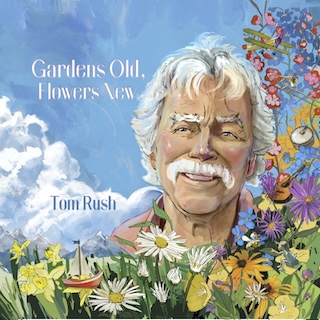 1. GARDENS OLD, FLOWERS NEW, Tom Rush (Appleseed Recordings)–Folk singer Tom Rush, who has been performing and recording for more than 60 years, has long been known primarily as an adept interpreter of other writers’ songs. His 1968 album The Circle Game famously helped to introduce Joni Mitchell, James Taylor, and Jackson Browne to wide audiences, and well-chosen covers dominate the other albums in his catalog.
1. GARDENS OLD, FLOWERS NEW, Tom Rush (Appleseed Recordings)–Folk singer Tom Rush, who has been performing and recording for more than 60 years, has long been known primarily as an adept interpreter of other writers’ songs. His 1968 album The Circle Game famously helped to introduce Joni Mitchell, James Taylor, and Jackson Browne to wide audiences, and well-chosen covers dominate the other albums in his catalog.
Unlike most of Rush’s LPs, however, 2018’s Voices found him emphasizing his own material on an album that included 10 self-penned numbers along with his arrangements of two traditional tunes. On the occasion of Appleseed Recordings’ 25th anniversary, he’s back with Gardens Old, Flowers New, which like its most recent predecessor consists almost entirely of new original compositions. (The sole exception is “Gimme Some of It,” which melds new lyrics by Rush to a honky-tonk-piano-enhanced version of an old blues tune called “Custard Pie.”)

‘To See My Baby Smile,’ Tom Rush, from Gardens Old, Flowers New
He says that the new album’s title, which shows up in the lyrics for two tracks, is meant “to convey the idea that many things in life–watching your child learn about the world or falling in love–have happened millions and millions of times through the eons but each time is always fresh and different.” In fact, Gardens Old, Flowers New itself tackles old subjects in new and distinctive ways. There are touching love songs such as “To See My Baby Smile” and “If You Love Me”; and, like all Rush albums, this one offers light moments as well, among them “I Quit,” which fits in the title of Mitchell’s “Urge for Going” and is lyrically a bit reminiscent of Robert Earl Keen’s “I Gotta Go.” Follow this link to the full review by Jeff Burger in The Aquarian.
 2. HIYO, Chatham County Line (Yep Rock Records)— When Chatham County Line lost its stalwart banjo player Chandler Holt to retirement, the remaining band members did the right thing: they reinvented themselves, adopted new ideas about soundscapes, found fresh sonics in traditional instruments and adopted other ideas from a wide palette of sounds they heard around them. Now the trio of Dave Wilson, John Teer and Greg Readling, supplemented by synths, optigan, mellotron, octave mandolin, and clavinet fashioning often otherworldly, ambient settings, rises strikingly altered from the band that claims four #1 bluegrass albums among its achievements. Hats off to producer Rachael Moore (whose resume includes work with Kasey Musgraves and Allison Krause, among other A-listers) for recognizing a band “ready to be pushed out of their comfort zone,” as she told WALTER Magazine’s Addie Ladner, to which John Teer added: “This album shows we aren’t afraid of trying new things. We are proud of every single song.” Indeed, in Hiyo’s roiling backdrops you can hear the chilling fatalism of the Earl Brothers, the multicultural bravado of the Duhks, a James Justin-like poetic evocation of place, nature and time, and of God’s moving hand directing life’s journey, and most profoundly, you can hear, and feel, the musicians’ courage in embracing the new. Follow this link to the full review by David McGee, “Right on Time, Indeed,” in Deep Roots.
2. HIYO, Chatham County Line (Yep Rock Records)— When Chatham County Line lost its stalwart banjo player Chandler Holt to retirement, the remaining band members did the right thing: they reinvented themselves, adopted new ideas about soundscapes, found fresh sonics in traditional instruments and adopted other ideas from a wide palette of sounds they heard around them. Now the trio of Dave Wilson, John Teer and Greg Readling, supplemented by synths, optigan, mellotron, octave mandolin, and clavinet fashioning often otherworldly, ambient settings, rises strikingly altered from the band that claims four #1 bluegrass albums among its achievements. Hats off to producer Rachael Moore (whose resume includes work with Kasey Musgraves and Allison Krause, among other A-listers) for recognizing a band “ready to be pushed out of their comfort zone,” as she told WALTER Magazine’s Addie Ladner, to which John Teer added: “This album shows we aren’t afraid of trying new things. We are proud of every single song.” Indeed, in Hiyo’s roiling backdrops you can hear the chilling fatalism of the Earl Brothers, the multicultural bravado of the Duhks, a James Justin-like poetic evocation of place, nature and time, and of God’s moving hand directing life’s journey, and most profoundly, you can hear, and feel, the musicians’ courage in embracing the new. Follow this link to the full review by David McGee, “Right on Time, Indeed,” in Deep Roots.

‘Way Down Yonder,’ Chatham County Line, from Hiyo
 3. WINTERSONGS, Laila Biali (www.lailabiali.com)– You’ll find few finer seasonal travelers than Canadian singer-songwriter Laila Biali. Though her Wintersongs boasts a moment or two of muscular sonic outbursts (the 6:54 “Dance of the Pines” features some wild upper register clarinet flights, thundering drums and frantic piano fills amidst its otherwise serene ambience), the project as a whole is more soothing and contemplative of the winter wonderland Ms. Biali beholds in this, her tenth album recording as a band leader. It sprang from a writing retreat at the Banff Centre in the heart of Canada’s Rocky Mountains, a place where the artist goes “to meet my muse,” she says. The result will remind some listeners of George Winston’s December, as well it should, whereas others will hear echoes of Norwegian composer Ola Gjeilo’s 2017 gem, Winter Songs (reviewed in Deep Roots last month), especially in the balance between silence and euphoria—“Dance of the Pines” is not alone in its high-spirited moments as “Keep On Moving” is a full-on band attack featuring Ms. Biali’s nimble fingers sprinting across the 88s, the Venuti String Quartet in full flower, a trio of big-voiced background singers, all in service to Ms. Biali’s breathy delivery of a tale taken partly from “Winter Wonderland” (a reference to “Parson Brown” jumps out) and partly from “Jingle Bells” along with a rather urgent appeal to “keep on moving.”
3. WINTERSONGS, Laila Biali (www.lailabiali.com)– You’ll find few finer seasonal travelers than Canadian singer-songwriter Laila Biali. Though her Wintersongs boasts a moment or two of muscular sonic outbursts (the 6:54 “Dance of the Pines” features some wild upper register clarinet flights, thundering drums and frantic piano fills amidst its otherwise serene ambience), the project as a whole is more soothing and contemplative of the winter wonderland Ms. Biali beholds in this, her tenth album recording as a band leader. It sprang from a writing retreat at the Banff Centre in the heart of Canada’s Rocky Mountains, a place where the artist goes “to meet my muse,” she says. The result will remind some listeners of George Winston’s December, as well it should, whereas others will hear echoes of Norwegian composer Ola Gjeilo’s 2017 gem, Winter Songs (reviewed in Deep Roots last month), especially in the balance between silence and euphoria—“Dance of the Pines” is not alone in its high-spirited moments as “Keep On Moving” is a full-on band attack featuring Ms. Biali’s nimble fingers sprinting across the 88s, the Venuti String Quartet in full flower, a trio of big-voiced background singers, all in service to Ms. Biali’s breathy delivery of a tale taken partly from “Winter Wonderland” (a reference to “Parson Brown” jumps out) and partly from “Jingle Bells” along with a rather urgent appeal to “keep on moving.”

‘Rocky Mountain Lullaby,’ Laila Biali, from Wintersongs
The reflective passages best capture the imagination—the exotic ambience established by Drew Jurecka’s bandoneon over a lilting arrangement with piano trills and romantic strings on “Winter Waltz” not only sounds Parisianm it is in fact an instrumental version of a French chanson Biali wrote with Sonia Johnson released last year as Belle nuit de Noël; it also happens to sound very much like a Mancini score from the ‘60s; speaking of romantic, look no farther than “Snow” for its lush strings and sensuous Biali vocal with its Streisand hints, reflecting on “the memories that lay frozen long ago”; and the album opening, “Drifting Down Ice,” with its repeating piano figure like falling snow (a little Guaraldi touch there) and Biali’s soft humming vocal adding a yearning texture as the song builds to a crescendo before resolving with a tempo change to a soft landing, “drifting down, drifting down,” followed evocatively by a lovely “Rocky Mountain Lullaby,” a warm, cozy love song to romance in the natural world, with a flute soloist enhancing the luscious string-rich atmospherics. Baby, it’s cold outside, but Wintersongs asks, Isn’t it romantic? –-David McGee
 4. TWISTED SAGE, Kenny Kosek with Tony Trischka (Shefa Records)–If anything qualifies as an event in bluegrass/old-timey music, it’s when the likes of fiddler Kenny Kosek teams up with the likes of banjo virtuoso Tony Trischka, with perhaps the likes of mandolinist par excellence Andy Statman dropping by to lend a hand here and there, and you get a thoroughly engaging and elevating album such as Twisted Sage. The Kosek humor is in abundant evidence here: in the press materials accompanying the album he describes the title track as bringing to mind “the white sage that Native Americans burn in a purifying ceremony, a wreach of sage, and of course a deranged savant.” (He also notes “twisted sage” being a yoga position.) This only adds to the jubilant romp he and Trischka engage in for three minutes-plus, chasing each other with the fury of a dog going after a squirrel, with juking, darting, riotously rambunctious byplay and interplay in their fleet display. And who is not a fan of the original Godzilla movie, Gojira? Kosek certainly is, and he and banjoist Marty Cutler find an old-timey way in to that cinema classic’s Japanese Army March in a scintillating fiddle-and-banjo duet titled “Gojira County Breakdown.” Andy Statman shows up on four numbers, notably teaming with Kosek and Trishka on a dazzling three-part treatment of “Turkeys in the Straw” in which each musician takes a solo moment to work variations on the main theme, all leading up to a rousing, “manically fast” (Kosek’s words) closing surge to an arrangement Kosek’s notes claim was “developed over decades of NYC Board of Education ‘ham boning.’” Statman also rules the roost, so to speak, with a breathtaking solo within the fusillade of strings captured on “Jewish Dance.” In short, the song selections span the globe and time, kicking off the strutting “Streak O’Lean Streak O’ Fat” (Kosek learned it from a 1931 Okey Records recording by A.A. Gray with 7-Foot Dilly and his Dill Pickles); the Shetland tune “Da New Rigged Ship” paired with “Polly Grand”; and another memorable turn with Statman on board for a live version of the tender ballad “Maiden’s Prayer,” the Bob Wills Western Swing standard that Wills reconfigured for fiddle from an 1856 piano reverie by Tekla Badarzweska-Baranowska.
4. TWISTED SAGE, Kenny Kosek with Tony Trischka (Shefa Records)–If anything qualifies as an event in bluegrass/old-timey music, it’s when the likes of fiddler Kenny Kosek teams up with the likes of banjo virtuoso Tony Trischka, with perhaps the likes of mandolinist par excellence Andy Statman dropping by to lend a hand here and there, and you get a thoroughly engaging and elevating album such as Twisted Sage. The Kosek humor is in abundant evidence here: in the press materials accompanying the album he describes the title track as bringing to mind “the white sage that Native Americans burn in a purifying ceremony, a wreach of sage, and of course a deranged savant.” (He also notes “twisted sage” being a yoga position.) This only adds to the jubilant romp he and Trischka engage in for three minutes-plus, chasing each other with the fury of a dog going after a squirrel, with juking, darting, riotously rambunctious byplay and interplay in their fleet display. And who is not a fan of the original Godzilla movie, Gojira? Kosek certainly is, and he and banjoist Marty Cutler find an old-timey way in to that cinema classic’s Japanese Army March in a scintillating fiddle-and-banjo duet titled “Gojira County Breakdown.” Andy Statman shows up on four numbers, notably teaming with Kosek and Trishka on a dazzling three-part treatment of “Turkeys in the Straw” in which each musician takes a solo moment to work variations on the main theme, all leading up to a rousing, “manically fast” (Kosek’s words) closing surge to an arrangement Kosek’s notes claim was “developed over decades of NYC Board of Education ‘ham boning.’” Statman also rules the roost, so to speak, with a breathtaking solo within the fusillade of strings captured on “Jewish Dance.” In short, the song selections span the globe and time, kicking off the strutting “Streak O’Lean Streak O’ Fat” (Kosek learned it from a 1931 Okey Records recording by A.A. Gray with 7-Foot Dilly and his Dill Pickles); the Shetland tune “Da New Rigged Ship” paired with “Polly Grand”; and another memorable turn with Statman on board for a live version of the tender ballad “Maiden’s Prayer,” the Bob Wills Western Swing standard that Wills reconfigured for fiddle from an 1856 piano reverie by Tekla Badarzweska-Baranowska.

‘Twisted Sage,’ Kenny Kosek and Tony Trischka, from Twisted Sage
 5. BLUEGRASS TRACKS, Andy Statman (Shefa Records)— With Kenny Kosek being from the Bronx, NY, and Andy Statman from Queens, New York City has produced two of the foremost roots musicians above or below the Mason-Dixon Line. It’s a good year when these two masters release new projects, and so it is that Bluegrass Tracks, Statman’s followup to his ambitious (and daring) Monroe Bus, is recognized as one of the year’s finest roots releases. It’s a departure from Monroe Bus much as Monroe Bus was a departure from Statman’s numerous journeys into the jazz-klezmer nexus on albums such as Between Heaven & Earth: Music of the Jewish Mystics and The Hidden Light. The tellingly titled Bluegrass Tracks brings him back to traditional bluegrass in recordings made in a four-day rush before the pandemic shutdown. The all-stars accompanying Statman included fiddling legend Byron Berline (in one of his final sessions before his passing in 2021), Ron Stewart (fiddle and banjo), Bryan Sutton (guitar) and Mike Bub (bass). Not that Andy Statman needs any help on mandolin, but Ricky Skaggs to lend some double-mandolin fury to the album opening Bill Monroe classic, “Stony Lonesome,” returning later for a breathtaking speed-picked sprint between mandolin and fiddle on the traditional “Katy Hill.” Andy cuts out mightily on mandolin in laying the groundwork for equally impossible solos by Stewart and Sutton in setting the stage for a lively vocal turn courtesy Tim O’Brien on a version of “Bile ‘Em Cabbage Down” that might well be the finest rendition you’ve heard since Andy Griffith joined the Dillards in a memorable workout on The Andy Griffith Show. The tracks include a number of Statman originals as well, with “Two Pants Suit” injecting a bluesy affect into its midtempo bluegrass renderings (Statman has a killer solo here too), and “If You Only Knew” might well be a country heartbreaker if it had lyrics, but the tender solos all around lay the ache on a listener pretty well, thank you. As does the album closer, “Blessing,” a gentle, melodic instrumental, plaintive and poignant, with beautiful heart-tugging solos (Ron Stewart and Byron Berline on twin fiddles) in what serves as the album’s benediction. Challenging and life affirming, Andy Statman’s music plumbs the depths of time in becoming timeless itself. –David McGee
5. BLUEGRASS TRACKS, Andy Statman (Shefa Records)— With Kenny Kosek being from the Bronx, NY, and Andy Statman from Queens, New York City has produced two of the foremost roots musicians above or below the Mason-Dixon Line. It’s a good year when these two masters release new projects, and so it is that Bluegrass Tracks, Statman’s followup to his ambitious (and daring) Monroe Bus, is recognized as one of the year’s finest roots releases. It’s a departure from Monroe Bus much as Monroe Bus was a departure from Statman’s numerous journeys into the jazz-klezmer nexus on albums such as Between Heaven & Earth: Music of the Jewish Mystics and The Hidden Light. The tellingly titled Bluegrass Tracks brings him back to traditional bluegrass in recordings made in a four-day rush before the pandemic shutdown. The all-stars accompanying Statman included fiddling legend Byron Berline (in one of his final sessions before his passing in 2021), Ron Stewart (fiddle and banjo), Bryan Sutton (guitar) and Mike Bub (bass). Not that Andy Statman needs any help on mandolin, but Ricky Skaggs to lend some double-mandolin fury to the album opening Bill Monroe classic, “Stony Lonesome,” returning later for a breathtaking speed-picked sprint between mandolin and fiddle on the traditional “Katy Hill.” Andy cuts out mightily on mandolin in laying the groundwork for equally impossible solos by Stewart and Sutton in setting the stage for a lively vocal turn courtesy Tim O’Brien on a version of “Bile ‘Em Cabbage Down” that might well be the finest rendition you’ve heard since Andy Griffith joined the Dillards in a memorable workout on The Andy Griffith Show. The tracks include a number of Statman originals as well, with “Two Pants Suit” injecting a bluesy affect into its midtempo bluegrass renderings (Statman has a killer solo here too), and “If You Only Knew” might well be a country heartbreaker if it had lyrics, but the tender solos all around lay the ache on a listener pretty well, thank you. As does the album closer, “Blessing,” a gentle, melodic instrumental, plaintive and poignant, with beautiful heart-tugging solos (Ron Stewart and Byron Berline on twin fiddles) in what serves as the album’s benediction. Challenging and life affirming, Andy Statman’s music plumbs the depths of time in becoming timeless itself. –David McGee

‘Bile ‘Em Cabbage Down,’ Andy Statman (mandolin), Ron Stewart (banjo and fiddle), Bryan Sutton (guitar), Byron Berline (fiddle), Mike Bub (bass), Tim O’Brien (vocal), from Bluegrass Tracks
 6. TEARS IN MY EYES, Anthony Geraci (Blue Heart Records)–Imagine for a moment that Tears in My Eyes, Anthony Geraci’s latest gem, is a vinyl record. If it were, a listener could drop the tonearm on a heated, Allmans-inspired workout, “Witchy Ways,” complete with a gritty vocal warning of a certain woman’s alluring appeal by Barrett Anderson (who’s also supplying those familiar slide guitar howls) amid a swirling soundscape keyed by Geraci’s spirited workout on the 88s; or you could set it down on “Lonely Country Blues,” a lovely but winsome instrumental in which Geraci’s aching piano melody—with its trills doing justice to the memory of Floyd Cramer–is bolstered by an equally evocative Anderson guitar solo, all blending to make the title sentiment ever more vivid and even more lonely and isolated than the title admits; or drop it down on the album opener, a lowdown blues called “Broken Mirror, Broken Mirror,” bemoaning a raft of bad luck and trouble, potently rendered vocally by Geraci’s former boss in the Bluetones, Sugar Ray Norcia (who makes two more memorable appearances here, divesting himself of a lowdown, aggrieved report from a man falsely accused of murder in “Judge, Oh Judge,” a blues ballad made doubly deep by Mario Perrett’s plaintive sax solo, all cries and wails; and delivering a performance from deep in despair on “Now What,” a wrenching account of a relationship falling apart [“I couldn’t see your tears/through the ones in my own eyes”], with Geraci’s mournful piano solo and gently weeping Hammond organ seconding that emotion ahead of saxophonist Drew Davies adding charged emotion to the soundscape before Sugar Ray re-enters pleading for diving guidance to make things right). Follow this link to the full review by David McGee, “In Heavy Rotation: Really the Blues,” in Deep Roots.
6. TEARS IN MY EYES, Anthony Geraci (Blue Heart Records)–Imagine for a moment that Tears in My Eyes, Anthony Geraci’s latest gem, is a vinyl record. If it were, a listener could drop the tonearm on a heated, Allmans-inspired workout, “Witchy Ways,” complete with a gritty vocal warning of a certain woman’s alluring appeal by Barrett Anderson (who’s also supplying those familiar slide guitar howls) amid a swirling soundscape keyed by Geraci’s spirited workout on the 88s; or you could set it down on “Lonely Country Blues,” a lovely but winsome instrumental in which Geraci’s aching piano melody—with its trills doing justice to the memory of Floyd Cramer–is bolstered by an equally evocative Anderson guitar solo, all blending to make the title sentiment ever more vivid and even more lonely and isolated than the title admits; or drop it down on the album opener, a lowdown blues called “Broken Mirror, Broken Mirror,” bemoaning a raft of bad luck and trouble, potently rendered vocally by Geraci’s former boss in the Bluetones, Sugar Ray Norcia (who makes two more memorable appearances here, divesting himself of a lowdown, aggrieved report from a man falsely accused of murder in “Judge, Oh Judge,” a blues ballad made doubly deep by Mario Perrett’s plaintive sax solo, all cries and wails; and delivering a performance from deep in despair on “Now What,” a wrenching account of a relationship falling apart [“I couldn’t see your tears/through the ones in my own eyes”], with Geraci’s mournful piano solo and gently weeping Hammond organ seconding that emotion ahead of saxophonist Drew Davies adding charged emotion to the soundscape before Sugar Ray re-enters pleading for diving guidance to make things right). Follow this link to the full review by David McGee, “In Heavy Rotation: Really the Blues,” in Deep Roots.

‘Tears in My Eyes,’ Anthony Geraci with his Boston Blues All Stars, the title track from the new album
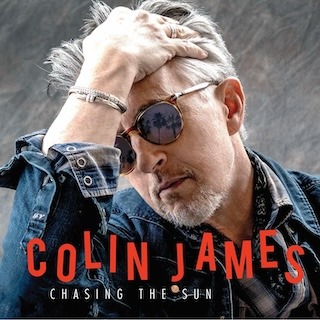 7. CHASING THE SUN, Colin James (Stony Plain)– Twenty-one albums into his career, veteran Canadian bluesman Colin James is very much in possession of his fastball on the captivating Chasing the Sun. In the “a little help from my friends” category, James is aided by his co-producer, Colin Linden, himself a gifted guitarist and songwriter in addition to his mastery behind the board on this, his sixth album with James. In fact, one of the highlights here is a stomping take on a Linden-Paul Reddick copyright, “Devilment,” complete with a raucous Chicago vibe and Charlie Musselwhite adding spry, keening harp touches to the proceedings, fashioning a stinging sonic warming to the lyrics’ wary regard of a certain femme fatale as expressed in James’s impassioned, accusatory vocal. The powerhouse rhythm section throughout is comprised of seasoned vets Daryl Jones (bass) and Paul Drayton (drums), whose resumes include major projects with household names from the rock, folk and jazz worlds. In addition to Musselwhite, other memorable guest cameos feature Lucinda Williams joining in on a verse of her self-penned urgent plea for “Protection,” the album opener to which Ann and Regina McCrary add gospel-infused intensity as they do on the album closer, James’s (a co-write with Tom Wilson) gritty appeal for tolerance and understanding articulated amidst an ominous, swampy, swirling ambiance in “Open Your Mind.” Whether working in a basic band configuration or showing off an effective changeup (torturing the baseball metaphor here) in an acoustic-electric trio lineup, James digs deep at every turn. Follow this link to the full review by David McGee, “In Heavy Rotation: Really the Blues,” in Deep Roots.
7. CHASING THE SUN, Colin James (Stony Plain)– Twenty-one albums into his career, veteran Canadian bluesman Colin James is very much in possession of his fastball on the captivating Chasing the Sun. In the “a little help from my friends” category, James is aided by his co-producer, Colin Linden, himself a gifted guitarist and songwriter in addition to his mastery behind the board on this, his sixth album with James. In fact, one of the highlights here is a stomping take on a Linden-Paul Reddick copyright, “Devilment,” complete with a raucous Chicago vibe and Charlie Musselwhite adding spry, keening harp touches to the proceedings, fashioning a stinging sonic warming to the lyrics’ wary regard of a certain femme fatale as expressed in James’s impassioned, accusatory vocal. The powerhouse rhythm section throughout is comprised of seasoned vets Daryl Jones (bass) and Paul Drayton (drums), whose resumes include major projects with household names from the rock, folk and jazz worlds. In addition to Musselwhite, other memorable guest cameos feature Lucinda Williams joining in on a verse of her self-penned urgent plea for “Protection,” the album opener to which Ann and Regina McCrary add gospel-infused intensity as they do on the album closer, James’s (a co-write with Tom Wilson) gritty appeal for tolerance and understanding articulated amidst an ominous, swampy, swirling ambiance in “Open Your Mind.” Whether working in a basic band configuration or showing off an effective changeup (torturing the baseball metaphor here) in an acoustic-electric trio lineup, James digs deep at every turn. Follow this link to the full review by David McGee, “In Heavy Rotation: Really the Blues,” in Deep Roots.

‘Too Far Gone,’ Colin James, from Chasing the Sun
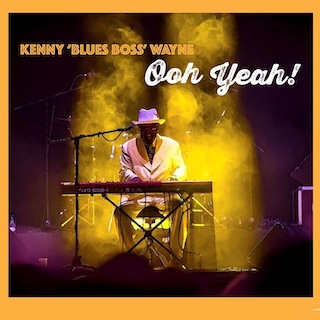 8. OOH YEAH!, Kenny ‘Blues Boss’ Wayne (Stony Plain Records)– Canadian boogie-woogie legend Kenny “Blues Boss” Wayne, now in his 80th year, joins the growing list of octogenarians making some of the best music of their storied careers. With no time to waste, the Boogie Woogie Hall of Famer kicks off the title track with a hard driving workout on the 88s and adds a frisky vocal to boot while drummer Joey DiMarco keeps the frantic rhythm pulsating underneath. On a topical note, check out the gritty challenge of “Whatcha Gonna Do Now,” with Jimmy Bowskill’s banjo adding a rural flavor to the forthright march tempo as Wayne’s matter-of-fact vocal inveighs against environmental and social contract failures aplenty, much as he does on a funky, percolating offering, “My Point of View,” in lamenting those whose implacable views brook no chance “to see a better place/for this human race.” Even in the funky, horn- and banjo-fueled heat of the furious dance hall ambience adorning “Try It Out,” the Blues Boss takes flight on the keys while delivering a Staples-style sermon counseling common sense (“read between the lines/to know the full story”) as the antidote to hate speech. Cooking mightily throughout, Ooh Yeah! Channels the energy and excitement its title suggests, and then some. –David McGee
8. OOH YEAH!, Kenny ‘Blues Boss’ Wayne (Stony Plain Records)– Canadian boogie-woogie legend Kenny “Blues Boss” Wayne, now in his 80th year, joins the growing list of octogenarians making some of the best music of their storied careers. With no time to waste, the Boogie Woogie Hall of Famer kicks off the title track with a hard driving workout on the 88s and adds a frisky vocal to boot while drummer Joey DiMarco keeps the frantic rhythm pulsating underneath. On a topical note, check out the gritty challenge of “Whatcha Gonna Do Now,” with Jimmy Bowskill’s banjo adding a rural flavor to the forthright march tempo as Wayne’s matter-of-fact vocal inveighs against environmental and social contract failures aplenty, much as he does on a funky, percolating offering, “My Point of View,” in lamenting those whose implacable views brook no chance “to see a better place/for this human race.” Even in the funky, horn- and banjo-fueled heat of the furious dance hall ambience adorning “Try It Out,” the Blues Boss takes flight on the keys while delivering a Staples-style sermon counseling common sense (“read between the lines/to know the full story”) as the antidote to hate speech. Cooking mightily throughout, Ooh Yeah! Channels the energy and excitement its title suggests, and then some. –David McGee

‘Watcha Gonna Do Now,’ Kenny ‘Blues Boss’ Wayne, from Ooh Yeah!
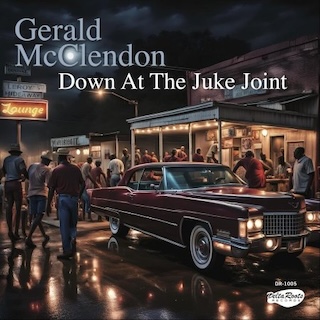 9. DOWN AT THE JUKE JOINT, Gerald McLendon (Delta Roots Records)– Around Chicago Gerald McLendon has earned the nickname “The Soul Keeper,” not simply for staying true to a timeless soul blues style with both southern and urban roots but equally so for the depth of feeling he invests in every lyric. For instance, surrendering to the cosmic ache and abject pain in his account of realizing the desolation of loneliness he limns in producer Twist Turner’s grinding lament, “House Ain’t a Home,” in surveying the fallout from a failed relationship. Turner’s arrangements are of the old school soul and blues variety, thick with howling guitars, portentous washes of organ and Fender Rhodes and piercing horn blasts to which McLendon steps in with more than a little gospel feel, recounting his broken spirit in “Back Where You Belong,” with Mike Jackson’s wailing sax complementing McLendon’s Solomon Burke-like testifying. He descends ever deeper into despair in “Cryin’ Time Again,” another heartbroken melody (“looks like it’s cryin’ time again/I wonder will I ever find happiness…”) set to an unyielding backdrop of funereal keyboards and somber percussion underscoring the singer’s barren future. There’s a bright moment here and there, but McLendon fully embodies a truly broken soul at large in the land, no direction home. God bless. –David McGee
9. DOWN AT THE JUKE JOINT, Gerald McLendon (Delta Roots Records)– Around Chicago Gerald McLendon has earned the nickname “The Soul Keeper,” not simply for staying true to a timeless soul blues style with both southern and urban roots but equally so for the depth of feeling he invests in every lyric. For instance, surrendering to the cosmic ache and abject pain in his account of realizing the desolation of loneliness he limns in producer Twist Turner’s grinding lament, “House Ain’t a Home,” in surveying the fallout from a failed relationship. Turner’s arrangements are of the old school soul and blues variety, thick with howling guitars, portentous washes of organ and Fender Rhodes and piercing horn blasts to which McLendon steps in with more than a little gospel feel, recounting his broken spirit in “Back Where You Belong,” with Mike Jackson’s wailing sax complementing McLendon’s Solomon Burke-like testifying. He descends ever deeper into despair in “Cryin’ Time Again,” another heartbroken melody (“looks like it’s cryin’ time again/I wonder will I ever find happiness…”) set to an unyielding backdrop of funereal keyboards and somber percussion underscoring the singer’s barren future. There’s a bright moment here and there, but McLendon fully embodies a truly broken soul at large in the land, no direction home. God bless. –David McGee

‘Crying’ Time Again,’ Gerald McClendon, from Down at the Juke Joint
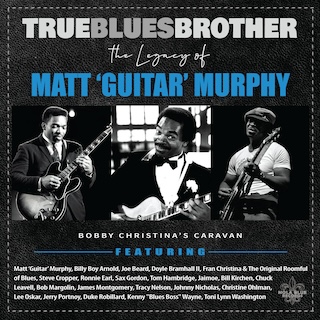 10. TRUE BLUES BROTHER: THE LEGACY OF MATT ‘GUITAR’ MURPHY, Bobby Christina’s Caravan (Nola Blue Records)—Matt “Guitar” Murphy may not have become the household blues name that, say, B.B. King was, but blues fans knew him and his clean, soulful guitar work well. Born in Sunflower, Mississippi, and raised in Memphis, he migrated to Chicago at age 19 and found work over the years backing giants on the order of Howlin’ Wolf, Memphis Slim and Little Junior Parker. Come 1980 he found himself cast as the guitarist in the band assembled by John Belushi and Dan Aykroyd for the Blues Brothers movie, after being recommended for the job by the late, great songwriter, Doc Pomus (who had a major hand in the band’s formation). In the ’90s he was with the James Cotton band, during which time he recorded his first solo album (Way Down South, 1990). A stroke derailed his career in 2000 but he returned to the stage to join Cotton at the 2010 Chicago Blues Festival. In 2018 he began work on a new solo album with the veteran drummer-producer Bobby Christina, whose brother Fran was in the original Roomful of Blues lineup. Christina’s concept for Murphy’s new album was to feature new songs from Matt along with tunes he had played on for other artists in which he would be teamed in the studio with guest artist he had played with over the years. Matt had written three new songs for the project, which were completed in what turned out to be the first and only session—Matt died suddenly of a heart attack on June 15, 2018.
10. TRUE BLUES BROTHER: THE LEGACY OF MATT ‘GUITAR’ MURPHY, Bobby Christina’s Caravan (Nola Blue Records)—Matt “Guitar” Murphy may not have become the household blues name that, say, B.B. King was, but blues fans knew him and his clean, soulful guitar work well. Born in Sunflower, Mississippi, and raised in Memphis, he migrated to Chicago at age 19 and found work over the years backing giants on the order of Howlin’ Wolf, Memphis Slim and Little Junior Parker. Come 1980 he found himself cast as the guitarist in the band assembled by John Belushi and Dan Aykroyd for the Blues Brothers movie, after being recommended for the job by the late, great songwriter, Doc Pomus (who had a major hand in the band’s formation). In the ’90s he was with the James Cotton band, during which time he recorded his first solo album (Way Down South, 1990). A stroke derailed his career in 2000 but he returned to the stage to join Cotton at the 2010 Chicago Blues Festival. In 2018 he began work on a new solo album with the veteran drummer-producer Bobby Christina, whose brother Fran was in the original Roomful of Blues lineup. Christina’s concept for Murphy’s new album was to feature new songs from Matt along with tunes he had played on for other artists in which he would be teamed in the studio with guest artist he had played with over the years. Matt had written three new songs for the project, which were completed in what turned out to be the first and only session—Matt died suddenly of a heart attack on June 15, 2018.

‘You Wasn’t Doin’ Too Good,’ Joe Beard (vocal and guitar) and Billy Boy Arnold (harmonica) from True Blues Brother: The Legacy of Matt ‘Guitar’ Murphy
Determined to pay tribute to Matt, Christina forged ahead, reaching out to Matt’s circle of musician friends. What was envisioned as a single disc tribute become a wonderful, exciting double-CD package featuring 72 top-drawer musicians who knew and/or had performed with Murphy. One of Matt’s new song, “Matt’s Boogie,” kicks off the set with Matt laying down those clean, lean, tonally rich lines that were his signature supported by Ricky “King” Russell on guitar, the indomitable Bruce Bears on organ, Bob Worthington on bass and Fran Christina on drums. Bears has a great solo rampaging across the keys, the rhythm section is tight and driving and the guitars are notable for their tasty, to-the-point soloing. Highlights are too numerous to mention when the remaining 23 tracks are so consistently remarkable but two favorites here would be Willie Dixon’s “I Can’t Quit You Babe,” fueled by Phil Diiorio’s down-and-out lead vocal, and the album closing gem, “You Wasn’t Doin’ Too Good,” a stark guitar-vocal-harmonica blues with a Hill Country flavor in Beard’s lowdown vocal shadowed by the great Billy Boy Arnold’s ominous howls on harmonica. –-David McGee
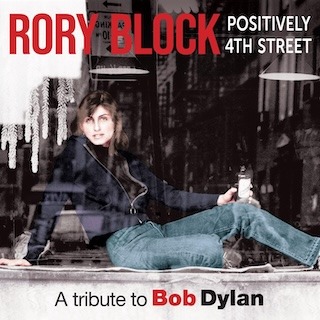 11. POSITIVELY 4TH STREET: A TRIBUTE TO BOB DYLAN, Rory Block (Stony Plain Records)– Fifty-nine seconds into the opening track of Rory Block’s moving tribute to Bob Dylan, she growls “Everything is broken.” In that instant, over her own swooping slide guitar lines and stomping percussion support, the sense of something important unfolding is manifest. The album’s first two of nine songs—“Everything is Broken” and “Ring Them Bells”—are from Dylan’s spiritually resonant 1989 album, Oh Mercy; the last two—“Mother of Muses” and a 20-minute “Murder Most Foul”—are from his 2020 masterpiece, Rough and Rowdy Ways. In between are one anguished solo acoustic gem from Time Out of Mind (“Not Dark Yet”) and three stone classics beginning with “Like a Rolling Stone.” In her stark readings and instrumental atmospherics, Block does nothing less than heighten what Dylan calls “the dread realities of life”—this, at a time when everything does indeed feel broken. As a blues singer she’s completely tapped into the ancient foundations of Dylan’s songs and, with vision clear and unwavering, takes them all to a place where we hear them, and Dylan, with new ears. The jaunty take on “Mr. Tambourine Man” allows some light into the proceedings but otherwise Positively 4th Street speaks profoundly to a time of darkness ascendant. –David McGee
11. POSITIVELY 4TH STREET: A TRIBUTE TO BOB DYLAN, Rory Block (Stony Plain Records)– Fifty-nine seconds into the opening track of Rory Block’s moving tribute to Bob Dylan, she growls “Everything is broken.” In that instant, over her own swooping slide guitar lines and stomping percussion support, the sense of something important unfolding is manifest. The album’s first two of nine songs—“Everything is Broken” and “Ring Them Bells”—are from Dylan’s spiritually resonant 1989 album, Oh Mercy; the last two—“Mother of Muses” and a 20-minute “Murder Most Foul”—are from his 2020 masterpiece, Rough and Rowdy Ways. In between are one anguished solo acoustic gem from Time Out of Mind (“Not Dark Yet”) and three stone classics beginning with “Like a Rolling Stone.” In her stark readings and instrumental atmospherics, Block does nothing less than heighten what Dylan calls “the dread realities of life”—this, at a time when everything does indeed feel broken. As a blues singer she’s completely tapped into the ancient foundations of Dylan’s songs and, with vision clear and unwavering, takes them all to a place where we hear them, and Dylan, with new ears. The jaunty take on “Mr. Tambourine Man” allows some light into the proceedings but otherwise Positively 4th Street speaks profoundly to a time of darkness ascendant. –David McGee

‘Positively Fourth Street,’ Rory Block, from Positively Fourth Street: A Tribute to Bob Dylan
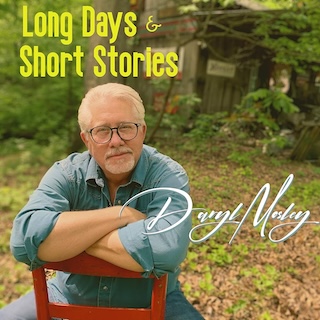 12. LONG DAYS & SHORT STORIES, Daryl Mosley (Pinecastle Records)– Nine out of the ten tracks included on Daryl Mosley’s new album Long Days & Short Stories are penned by Mosley alone, and he even claims credit for the bonus eleventh cut. It’s par for the course in the life of this prolific songwriting talent. It’s a measure of the respect he commands from his peers and contemporaries that Mosley’s fourth release for Pinecastle Records features a handful of guest contributors. Pianist Sarah Davidson, famed vocal duo Jeff & Sheri Easter, and the band New Tradition are among those playing a part in realizing Mosley’s songs. Instrumental performances abound throughout Long Days & Short Stories, providing Mosley’s unquestionable gifts with the best possible backing.
12. LONG DAYS & SHORT STORIES, Daryl Mosley (Pinecastle Records)– Nine out of the ten tracks included on Daryl Mosley’s new album Long Days & Short Stories are penned by Mosley alone, and he even claims credit for the bonus eleventh cut. It’s par for the course in the life of this prolific songwriting talent. It’s a measure of the respect he commands from his peers and contemporaries that Mosley’s fourth release for Pinecastle Records features a handful of guest contributors. Pianist Sarah Davidson, famed vocal duo Jeff & Sheri Easter, and the band New Tradition are among those playing a part in realizing Mosley’s songs. Instrumental performances abound throughout Long Days & Short Stories, providing Mosley’s unquestionable gifts with the best possible backing.
“When the Good Old Days Were New” has a brisk, forceful pace. However, Mosley expresses far from aggressive sentiments. It’s a down-beat elegiac reflection on seemingly simpler times for both the speaker, the masterfully sketched-out characters, and the nation at large. Jamie Harper’s fiddle playing leaves a deep impression on the tune. Mosley tempers the tempo for Long Days & Short Stories’ second song. “Everything That’s Right” is a song about keeping perspective when facing life’s insults and slights. It’s about remaining as true as possible to the principles first grounding you in life. Tony Wray’s banjo and six-string guitar flourishes are especially potent without sounding ostentatious. Follow this link to Mindy McCall’s full review in IndiePulse Music.

‘Everything That’s Right,’ Daryl Mosley, from Long Days & Short Stories
 13. THE SONG IN OUR SOUL, The Palomar Trio (Turtle Bay Records)– United by their mutual affection for classic swing music of the ‘20s through the ‘40s, and especially for the sound and style of the Benny Goodman Trio’s groundbreaking ‘30s recordings, Dan Levinson (clarinet, tenor sax), Mark Shayne (piano) and Kevin Dorn (drums) have been holding forth in New York City since the mid-‘90s, keeping the faith while reinvigorating forgotten gems of an earlier time. The Song in Our Soul, a play on the Fats Waller-Alex Hill chestnut, “Keep a Song In Your Soul,” which kicks off this album in lively, strutting fashion with a spirited dialogue between Levinson’s tenor sax and Shayne’s piano, finds the trio confidently plumbing 10 other tunes described by Levinson as “waiting to be rediscovered—and needing to be.” Follow this link to the full review, “Where’s the Wayback Machine, in Deep Roots.
13. THE SONG IN OUR SOUL, The Palomar Trio (Turtle Bay Records)– United by their mutual affection for classic swing music of the ‘20s through the ‘40s, and especially for the sound and style of the Benny Goodman Trio’s groundbreaking ‘30s recordings, Dan Levinson (clarinet, tenor sax), Mark Shayne (piano) and Kevin Dorn (drums) have been holding forth in New York City since the mid-‘90s, keeping the faith while reinvigorating forgotten gems of an earlier time. The Song in Our Soul, a play on the Fats Waller-Alex Hill chestnut, “Keep a Song In Your Soul,” which kicks off this album in lively, strutting fashion with a spirited dialogue between Levinson’s tenor sax and Shayne’s piano, finds the trio confidently plumbing 10 other tunes described by Levinson as “waiting to be rediscovered—and needing to be.” Follow this link to the full review, “Where’s the Wayback Machine, in Deep Roots.

‘In a Shanty in Old Shanty Town,’ a million seller for Johnny Long and His Orchestra in 1946 and a 10-week chart topper for Ted Lewis and His Band in 1932, when it was written for the movie The Crooner by a trio of writers, one of whom was popular singer-songwriter-pianist-actor Little Jack Little, who, 34 years later, was name-checked by Ed Norton in The Honeymooners’ episode “Young at Heart.” The Palomar Trio, from The Song In Our Soul.
 14. SOME GLAD MORNING, The Jake Leg Jug Band
(Green Bullet Records)– To categorize the Jake Leg Jug Band as simply a jug band leaves out the group’s traditional jazz, country, and bluegrass influences. All of these styles are on display on Some Glad Morning, a twelve-song collection of classic hymns, spirituals, and gospels. Joining the U.K.-based American roots music trio of Duncan Wilcox, Liam Ward, and Warren James are a team of talented supporting musicians and singers. The vocalists sing with gut-busting gusto on selections such as “Just Got Over at Last” and “Meeting at the Building.” They are supported by a mélange of instruments that include jaw harp, washboard, banjo, musical saw, comb and paper and, of course, jug. In other words, something akin to sacred skiffle. Follow this link to the full review by Bob Marovich in Deep Roots.
14. SOME GLAD MORNING, The Jake Leg Jug Band
(Green Bullet Records)– To categorize the Jake Leg Jug Band as simply a jug band leaves out the group’s traditional jazz, country, and bluegrass influences. All of these styles are on display on Some Glad Morning, a twelve-song collection of classic hymns, spirituals, and gospels. Joining the U.K.-based American roots music trio of Duncan Wilcox, Liam Ward, and Warren James are a team of talented supporting musicians and singers. The vocalists sing with gut-busting gusto on selections such as “Just Got Over at Last” and “Meeting at the Building.” They are supported by a mélange of instruments that include jaw harp, washboard, banjo, musical saw, comb and paper and, of course, jug. In other words, something akin to sacred skiffle. Follow this link to the full review by Bob Marovich in Deep Roots.

‘Just a Closer Walk With Thee,’ The Jake Leg Jug Band, from Some Glad Morning
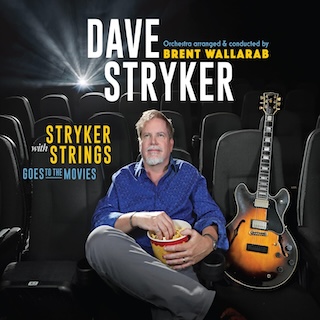 15. STRYKER WITH STRINGS GOES TO THE MOVIES, Dave Stryker with Orchestra arranged and conducted by Brent Wallarab (Strikezone Records)–The alternately floating, caressing and soaring strings surrounding and animating Stryker and his killer quartet (Xavier Davis on piano and Rhodes, Jeremy Allen on acoustic and electric bass and longtime drummer McClenty Hunter) come via a 30-piece studio orchestra (including a 17 piece string section) arranged and conducted by Brent Wallarab, co-leader of the Buselli-Wallarab Jazz Orchestra for three decades. Beyond Stryker’s always thoughtful, graceful, soulful and playfully swinging guitar solos, these vibrant, expansive arrangements also have openings for grand improvisational moments by stellar guests like Sara Caswell, who adds her violin fire to an energetic swirl through Peter Gabriel’s “In Your Eyes” and a subtle melancholy to Ellington’s “Low Key”; alto saxophonist Greg Ward, capturing the moody coolness of 70’s NYC on “Taxi Driver” and a bluesy crescendo to “Flirtibird”; and horn masters, trombonists Jim Pugh (adding both whimsy and emotional depth to “Moonglow”) and flugelhornist Mark Buselli (“Flirtibird”). In line with Stryker’s retro-minded Eight Track series, he naturally brings a snappy hipster grittiness to “Theme From Shaft.”– Jonathan Widen in Music That Sticks to My Soul.
15. STRYKER WITH STRINGS GOES TO THE MOVIES, Dave Stryker with Orchestra arranged and conducted by Brent Wallarab (Strikezone Records)–The alternately floating, caressing and soaring strings surrounding and animating Stryker and his killer quartet (Xavier Davis on piano and Rhodes, Jeremy Allen on acoustic and electric bass and longtime drummer McClenty Hunter) come via a 30-piece studio orchestra (including a 17 piece string section) arranged and conducted by Brent Wallarab, co-leader of the Buselli-Wallarab Jazz Orchestra for three decades. Beyond Stryker’s always thoughtful, graceful, soulful and playfully swinging guitar solos, these vibrant, expansive arrangements also have openings for grand improvisational moments by stellar guests like Sara Caswell, who adds her violin fire to an energetic swirl through Peter Gabriel’s “In Your Eyes” and a subtle melancholy to Ellington’s “Low Key”; alto saxophonist Greg Ward, capturing the moody coolness of 70’s NYC on “Taxi Driver” and a bluesy crescendo to “Flirtibird”; and horn masters, trombonists Jim Pugh (adding both whimsy and emotional depth to “Moonglow”) and flugelhornist Mark Buselli (“Flirtibird”). In line with Stryker’s retro-minded Eight Track series, he naturally brings a snappy hipster grittiness to “Theme From Shaft.”– Jonathan Widen in Music That Sticks to My Soul.

‘Taxi Driver’ (featuring Greg Ward), from Stryker With Strings Goes to the Movies. Orchestra arranged and conducted by Brent Wallarab.
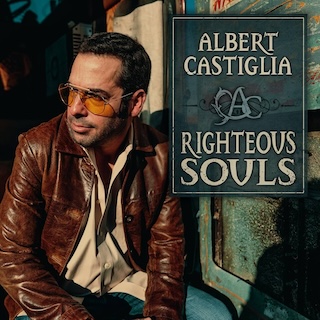 16. RIGHTEOUS SOULS, ALBERT CASTIGLIA (Gulf Coast Records)— Albert Castiglia has attracted some seriously A-List guests on these songs, starting with Popa Chubby on the blistering opening track “Centerline” followed by a ornery duet with Alabama Mike on the swinging “Get Down To The Nitty Gritty” (a Luther “Snake Boy” Johnson song), which on many another album would at least have been a contender for Favorite Song.
16. RIGHTEOUS SOULS, ALBERT CASTIGLIA (Gulf Coast Records)— Albert Castiglia has attracted some seriously A-List guests on these songs, starting with Popa Chubby on the blistering opening track “Centerline” followed by a ornery duet with Alabama Mike on the swinging “Get Down To The Nitty Gritty” (a Luther “Snake Boy” Johnson song), which on many another album would at least have been a contender for Favorite Song.
Sadly we tend to forget about the stories and lyrics in blues-rock songs, hanging on the riffs and choruses; but here Castiglia has obviously put as much, if not more time and effort into his writing and even choice of songs to cover as he’s done with the arrangements and guitar playing, which is stellar throughout.

‘You Can’t Judge a Book by the Cover,’ Albert Castilian in a duet with his daughter Wayne, from Righteous Souls. Guitar solo by Christine ‘Kingfish’ Ingram.
The Classics here are dusted down and re-varnished with due care and attention, making “You Can’t Judge a Book By The Cover” a sassy and salaciously sexy song the way he interacts with daughter Rayne, alongside some tricky guitar licks from Christone “Kingfish” Ingram; and later he makes Buddy Guy’s “The Dollar Done Fell” something of a damaged beauty the way the guitars interact and Albert pours his heart out and Lisa Anderson purrs soulfully in the background. The inclusion of a couple of Junior Wells’ songs, “Come On In the House,” “Till They Take It Away” and “What Momma Told Me,” featuring Rick Estrin and Monster Mike Welch, all of which really brings out the best in Castiglia both vocally and the way he cuts through everything with some dangerously razor sharp guitar playing. Follow this link to the full review by The Rocking Magpie.
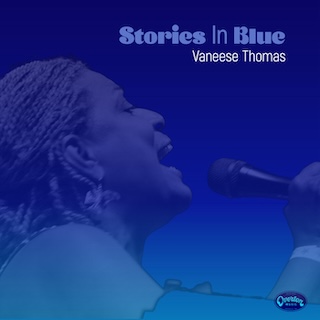 17. STORIES IN BLUE, Vaneese Thomas (Overton Records)—Of this amazing album no less a blues authority than Marty Gunther has declared that Vaneese Thomas (daughter of Rufus, sister of Carla) “delivers the gold standard of soul-blues here.” Might as well end this review right there, seeing as how the Gunther endorsement cannot be denied. Over the course of seven original songs Ms. Thomas deploys her commanding mezzo-soprano voice in powerful ways on arrangements running the gamut from deep blues to soul to gospel, accompanied by a stellar four-piece combo supplemented by horns and potent backup singers, all deeply invested in the Memphis groove and in Ms. Thomas’s narratives. She sets the tone of her discourse immediately on the album opening shuffle, “Do Y’all,” in which she demands, “Do y’all know where the blues comes from? And promptly answers: “Well it comes from places dark as night/bodies worn through toil and strife/do y’all know where the blues comes from.” Ms. Thomas doesn’t write fluff—her narratives are as raw and gripping as the groove is infectious and, at times, portentous. Hers is cathartic exercise in overcoming betrayal and heartbreak and facing the truth.
17. STORIES IN BLUE, Vaneese Thomas (Overton Records)—Of this amazing album no less a blues authority than Marty Gunther has declared that Vaneese Thomas (daughter of Rufus, sister of Carla) “delivers the gold standard of soul-blues here.” Might as well end this review right there, seeing as how the Gunther endorsement cannot be denied. Over the course of seven original songs Ms. Thomas deploys her commanding mezzo-soprano voice in powerful ways on arrangements running the gamut from deep blues to soul to gospel, accompanied by a stellar four-piece combo supplemented by horns and potent backup singers, all deeply invested in the Memphis groove and in Ms. Thomas’s narratives. She sets the tone of her discourse immediately on the album opening shuffle, “Do Y’all,” in which she demands, “Do y’all know where the blues comes from? And promptly answers: “Well it comes from places dark as night/bodies worn through toil and strife/do y’all know where the blues comes from.” Ms. Thomas doesn’t write fluff—her narratives are as raw and gripping as the groove is infectious and, at times, portentous. Hers is cathartic exercise in overcoming betrayal and heartbreak and facing the truth.

‘End of the Road,’ the a cappella gospel benediction of Vaneese Thomas’s Stories in Blue
The funky strut of “When You Were My Man” underpins a story of an woman waking up to the reality of her dying relationship and by. Implication moving on (“…the darkness did come/our love was undone…”) with guitarist Al Orlo and keyboard master Dave Keyes adding empathetic soloing along the way. The ominous backdrop of “The Last Thing on My Mind,” a sister tune to “When You Were My Man,” bemoans “a good thing” gone wrong that “broke my trust and shook my faith,” but even in the valley of tears her delivery suggests resilience. A delightful change of pace surfaces in the unrestrained swing of “1917,” with echoes of the Jazz Age in the horn punctuations framing lyrics honoring her illustrious father’s birth year, she noting with unrestrained joy, “life was hard but he was a star/we’ll remember him forever and a day,” as those horns wail righteously behind her. The big, soul-cleansing finish comes in the a cappella gospel benediction, “End of the Road,” in which Ms. Thomas and her supporting singers look not to death but to the end of earthly woes and the victory of salvation in Heaven (“Heaven is just a breath away”). It’s only seven songs in 24 minutes, but every minute counts, every minute is memorable and moving. –David McGee
 18. LIVE AT THE SCALA THEATRE, STOCKHOLM, Eric Bibb (Stony Plain)– In the press materials accompanying the release of his new live album, recorded at the Scala Theatre in Stockholm, Eric Bibb is referred to as “more than a blues troubadour—he is a storyteller and philosopher.” That claim is borne out with every note played, every lyric sung at Stockholm’s Scala Theatre on the night Bibb performed there in 2022. Something else is also apparent in the authority of Bibb’s performances; in the depth of feeling with which he invests every one of the 10 songs here (half of them Bibb originals, the other half being Bibb arrangements of traditional blues and folk tunes plus covers of blues chestnuts by Lead Belly and the Mississippi Sheiks’ Walter Vinson); in his obvious connection to his audience and they to him; in the palpable integrity he exudes as an artist fully invested in the messages he delivers—in these aspects Eric Bibb is picking up the mantle Harry Belafonte wore with authority during his entire career. In fact, the Lead Belly tune, “Bring Me Little Water, Sylvie,” a tune Lead Belly wrote in 1935, based on the memory of his uncle hollering to his wife Sylvie to bring him water while he was plowing the field, was once a Belafonte showcase moment. Finally released in 1946, Lead Belly’s “Sylvie” has since been covered by a host of household names including Bob Dylan, the Weavers, the Spinners, skiffle king Lonnie Donegan, even Bonanza’s Pernell Roberts (Eric also recorded a version with his folk singer father Leon Bibb) but most notably by Belafonte, whose 1955 recording with the Norman Luboff Choir limned the gospel underpinning of Lead Belly’s lyrical cry. So does Eric Bibb’s version lean on Belafonte’s spiritual foundation in a gentle arrangement lead by Bibb’s tender acoustic guitar supported by brush drums and world music atmospherics provided by kora and fiddle. Follow this link to the full review, “In Heavy Rotation: LIVEr Than Ever,” in Deep Roots.
18. LIVE AT THE SCALA THEATRE, STOCKHOLM, Eric Bibb (Stony Plain)– In the press materials accompanying the release of his new live album, recorded at the Scala Theatre in Stockholm, Eric Bibb is referred to as “more than a blues troubadour—he is a storyteller and philosopher.” That claim is borne out with every note played, every lyric sung at Stockholm’s Scala Theatre on the night Bibb performed there in 2022. Something else is also apparent in the authority of Bibb’s performances; in the depth of feeling with which he invests every one of the 10 songs here (half of them Bibb originals, the other half being Bibb arrangements of traditional blues and folk tunes plus covers of blues chestnuts by Lead Belly and the Mississippi Sheiks’ Walter Vinson); in his obvious connection to his audience and they to him; in the palpable integrity he exudes as an artist fully invested in the messages he delivers—in these aspects Eric Bibb is picking up the mantle Harry Belafonte wore with authority during his entire career. In fact, the Lead Belly tune, “Bring Me Little Water, Sylvie,” a tune Lead Belly wrote in 1935, based on the memory of his uncle hollering to his wife Sylvie to bring him water while he was plowing the field, was once a Belafonte showcase moment. Finally released in 1946, Lead Belly’s “Sylvie” has since been covered by a host of household names including Bob Dylan, the Weavers, the Spinners, skiffle king Lonnie Donegan, even Bonanza’s Pernell Roberts (Eric also recorded a version with his folk singer father Leon Bibb) but most notably by Belafonte, whose 1955 recording with the Norman Luboff Choir limned the gospel underpinning of Lead Belly’s lyrical cry. So does Eric Bibb’s version lean on Belafonte’s spiritual foundation in a gentle arrangement lead by Bibb’s tender acoustic guitar supported by brush drums and world music atmospherics provided by kora and fiddle. Follow this link to the full review, “In Heavy Rotation: LIVEr Than Ever,” in Deep Roots.

‘Goin’ Down the Road Feeling’ Bad,’ Eric Bibb, from Live at the Scala Theatre
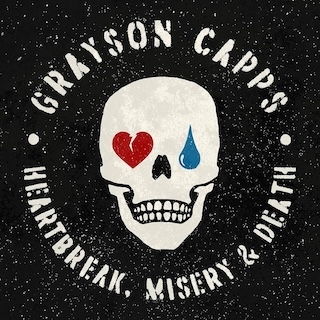 19. HEARTBREAK, MISERY & DEATH, Grayson Capps (Royal Potato Family)– By any standard, Alabama-based Grayson Capps is one of his generation’s first-tier singer-songwriters. So on this, one of the finest of his many fine albums, Capps offers no new original songs but rather deploys his earthy southern baritone at its most expressive best in service to 16 songs he learned during his childhood years, at his father’s knee, all of them critical to shaping his nascent musical sensibility and sensitivity. It should also be noted that with Heartbreak, Misery & Death, Capps shares with Connie Smith the award for 2024’s darkest album titles, hers being Love, Prison, Wisdom and Heartaches. Congratulations to all. These titles are misleading, however: whatever else the albums share, both can lift the spirits simply by dint of the artists’ full-throated commitment to their repertoire. … From the chilling a cappella rendition of Doc Watson’s “Wake Up Little Maggie” on through mesmerizing, minimalist arrangements (vocal, Capps’s tenderly fingerpicked acoustic guitar and his long-time musical compadre Corky Hughes’s atmospheric second voice on electric and bass guitars and “tiny piano”), Capps is consistently captivating. Consider the thoughtful probing of Leonard Cohen’s justly celebrated “Hallelujah” in a way that, with a big assist from Hughes’s gently weeping guitar, actually heightens its cry for spiritual redemption. Those readers now thinking they have heard enough “Hallelujah”s in their life might want to reconsider their position after hearing Capps’s measured, softly searing rendition. Follow this link to the full review by David McGee, “Consistently Captivating,” in Deep Roots.
19. HEARTBREAK, MISERY & DEATH, Grayson Capps (Royal Potato Family)– By any standard, Alabama-based Grayson Capps is one of his generation’s first-tier singer-songwriters. So on this, one of the finest of his many fine albums, Capps offers no new original songs but rather deploys his earthy southern baritone at its most expressive best in service to 16 songs he learned during his childhood years, at his father’s knee, all of them critical to shaping his nascent musical sensibility and sensitivity. It should also be noted that with Heartbreak, Misery & Death, Capps shares with Connie Smith the award for 2024’s darkest album titles, hers being Love, Prison, Wisdom and Heartaches. Congratulations to all. These titles are misleading, however: whatever else the albums share, both can lift the spirits simply by dint of the artists’ full-throated commitment to their repertoire. … From the chilling a cappella rendition of Doc Watson’s “Wake Up Little Maggie” on through mesmerizing, minimalist arrangements (vocal, Capps’s tenderly fingerpicked acoustic guitar and his long-time musical compadre Corky Hughes’s atmospheric second voice on electric and bass guitars and “tiny piano”), Capps is consistently captivating. Consider the thoughtful probing of Leonard Cohen’s justly celebrated “Hallelujah” in a way that, with a big assist from Hughes’s gently weeping guitar, actually heightens its cry for spiritual redemption. Those readers now thinking they have heard enough “Hallelujah”s in their life might want to reconsider their position after hearing Capps’s measured, softly searing rendition. Follow this link to the full review by David McGee, “Consistently Captivating,” in Deep Roots.

‘Hallelujah,’ Grayson Capps, from Heartbreak, Misery & Death
 20. DIRT ON MY DIAMONDS, VOL. 2, Kenny Wayne Shepherd (Mascot/Provogue Records)– Kenny Wayne Shepherd was all of 18 when his first album, 1995’s platinum-certified Ledbetter Heights, vaulted him into the blues-rock pantheon. Now 47, Shepherd is far more introspective and biographical in his writing than was his younger fire-breathing self to the point where even his covers sound personal. Dirt On My Diamonds, the second volume of a project Shepherd began in 2023, written and recorded at FAME Studios in Muscle Shoals, finds the artist and his seasoned band (which includes Stevie Ray’s drummer Chris “Whipper” Layton) at a creative and emotional peak, guitars sizzling, howling and wailing from the git-go, the rhythm section taught and propulsive, the bluesy vocals by Shepherd and his long-time compadre Noah Hunt impassioned, urgent and sensitive. Among the eight tracks is a stomping, seemingly autobiographical account of love triumphing over ambition in “I Never Made It To Memphis” (“I never knew I’d get lost in something that feels so right”); a slow-boiling, horn-infused bit of southern soul, “Watch You Go,” with Hunt lamenting the one that got away; and a broken-hearted Shepherd vocal decrying things gone wrong to the point where “My Guitar is Crying.” The lone cover among the eight cuts here? A blazing take on ZZ Top’s “She Loves My Automobile,” a double-entendre masterpiece featuring Shepherd’s muscular vocal over pounding percussion and relentlessly pumping horns aiding and abetting his soaring upper neck soloing. Hot stuff, all of this, but with a great big heart driving it. –David McGee
20. DIRT ON MY DIAMONDS, VOL. 2, Kenny Wayne Shepherd (Mascot/Provogue Records)– Kenny Wayne Shepherd was all of 18 when his first album, 1995’s platinum-certified Ledbetter Heights, vaulted him into the blues-rock pantheon. Now 47, Shepherd is far more introspective and biographical in his writing than was his younger fire-breathing self to the point where even his covers sound personal. Dirt On My Diamonds, the second volume of a project Shepherd began in 2023, written and recorded at FAME Studios in Muscle Shoals, finds the artist and his seasoned band (which includes Stevie Ray’s drummer Chris “Whipper” Layton) at a creative and emotional peak, guitars sizzling, howling and wailing from the git-go, the rhythm section taught and propulsive, the bluesy vocals by Shepherd and his long-time compadre Noah Hunt impassioned, urgent and sensitive. Among the eight tracks is a stomping, seemingly autobiographical account of love triumphing over ambition in “I Never Made It To Memphis” (“I never knew I’d get lost in something that feels so right”); a slow-boiling, horn-infused bit of southern soul, “Watch You Go,” with Hunt lamenting the one that got away; and a broken-hearted Shepherd vocal decrying things gone wrong to the point where “My Guitar is Crying.” The lone cover among the eight cuts here? A blazing take on ZZ Top’s “She Loves My Automobile,” a double-entendre masterpiece featuring Shepherd’s muscular vocal over pounding percussion and relentlessly pumping horns aiding and abetting his soaring upper neck soloing. Hot stuff, all of this, but with a great big heart driving it. –David McGee

‘My Guitar is Crying,’ Kenny Wayne Shepherd, from Dirt On My Diamonds, Vol. 2
 21. LET’S WALK, Madeleine Peyroux (Thirty Tigers)– Appropriate to the artist depicted on the cover in a low-light, meditative pose, Madeleine Peyroux opens her first album since 2018’s Anthem with a serene, heartwarming missive titled “Find True Love.” A tenderly picked acoustic guitar fashions a tuneful, laconic riff seconds before a feathery, whispery voice ascends over Andy Ezrin’s silky keyboard stylings, singing of bucolic pursuits along the way to rediscovering love.
21. LET’S WALK, Madeleine Peyroux (Thirty Tigers)– Appropriate to the artist depicted on the cover in a low-light, meditative pose, Madeleine Peyroux opens her first album since 2018’s Anthem with a serene, heartwarming missive titled “Find True Love.” A tenderly picked acoustic guitar fashions a tuneful, laconic riff seconds before a feathery, whispery voice ascends over Andy Ezrin’s silky keyboard stylings, singing of bucolic pursuits along the way to rediscovering love.
As it turns out, “Find True Love” is only superficially about rekindling passion and more specifically about engagement and understanding, inspired as it was by the reaction to George Floyd’s murder. So does the song set the stage for the long-player’s greater purpose of addressing the temper of the times, and not always in terms common to Ms. Peyroux’s signature cabaret-ish aesthetic. The title track, for example, takes its cues from southern gospel and the Civil Rights Movement alike with a soulful background chorus, stabs of electric guitar adding emphatic energy to the stomping arrangement, and the singer adopting harder, more staccato phrasing to get the message across, “We climb the mountainside/where seeds were planted/oh so long ago/it’s deep…” The whole album is deep indeed, from the Billie Holiday-ish cool groove of “Blues For Heaven” to the spoken-sung album closing PSA advocating healthy living, “Take Care.” Deep, like Madeleine Peyroux. -–David McGee

‘Blues for Heaven,’ Madeleine Peyroux, from Let’s Walk
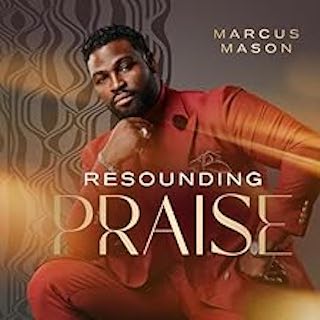 22. RESOUNDING PRAISE, Marcus Mason (Independent)- Although technically Resounding Praise is Marcus Mason’s solo album, it’s a collective accomplishment. Mason surrounds himself with a passel of capable vocalists, musicians, and producers who contribute their respective talents to this skillfully crafted and thoroughly enjoyable release. Mason, a descendant of Church of God in Christ founder Bishop C. H. Mason, shows himself to be a fine songwriter. He either wrote or co-wrote the songs with the album’s co-producer and Jennifer Hudson MD David Jackson, with additional assistance from others on a couple of tracks. A fondness for hymnody shines through a seamless interpolation of Fanny Crosby’s “Draw Me Nearer” on “Presence of Your Throne,” and a love of spirituals results in a snippet of “Standing in the Need of Prayer” embedded in the intimate “Heaven Hear Me Calling.” … Patricia Jackson is the brightest star in the album’s galaxy of accomplished vocalists. Her lovely, elastic, and church-honed soprano leads the title track as well as “Sweet Spirit,” one of the album’s most tenderhearted selections. Jackson and Bishop Norman Hutchins’ vocal director Tony Jones co-produce, and guitar hero Jonathan DuBose contributes his trademark licks. Follow this link to the full review by Bob Marovich in Deep Roots.
22. RESOUNDING PRAISE, Marcus Mason (Independent)- Although technically Resounding Praise is Marcus Mason’s solo album, it’s a collective accomplishment. Mason surrounds himself with a passel of capable vocalists, musicians, and producers who contribute their respective talents to this skillfully crafted and thoroughly enjoyable release. Mason, a descendant of Church of God in Christ founder Bishop C. H. Mason, shows himself to be a fine songwriter. He either wrote or co-wrote the songs with the album’s co-producer and Jennifer Hudson MD David Jackson, with additional assistance from others on a couple of tracks. A fondness for hymnody shines through a seamless interpolation of Fanny Crosby’s “Draw Me Nearer” on “Presence of Your Throne,” and a love of spirituals results in a snippet of “Standing in the Need of Prayer” embedded in the intimate “Heaven Hear Me Calling.” … Patricia Jackson is the brightest star in the album’s galaxy of accomplished vocalists. Her lovely, elastic, and church-honed soprano leads the title track as well as “Sweet Spirit,” one of the album’s most tenderhearted selections. Jackson and Bishop Norman Hutchins’ vocal director Tony Jones co-produce, and guitar hero Jonathan DuBose contributes his trademark licks. Follow this link to the full review by Bob Marovich in Deep Roots.

‘Sweet Spirit,’ Marcus Mason, with Patricia Jackson, from Resounding Praise
 23. THANK YOU, BROTHER BILL: A TRIBUTE TO BILL WITHERS, Kevin Burt (Gulf Coast Records)– Bill Withers’s songs have been attracting cover versions from the time he burst onto the national stage in 1971 with “Ain’t No Sunshine.” In the midst of the singer-songwriter boom, the plainspoken soulfulness of brother Bill’s beautifully crafted songs stood out—“Sunshine” for its bluesy lamenting, “Lean on Me” for its uplifting, gospel-rooted message of friendship and devotion, “Grandma’s Hands” for its irresistible pull of family devotion, the list goes on. No matter the multitudinous covers and sampling of the Withers oeuvre, though, Kevin Burt, with his powerful tribute, is serving notice of the need to embrace anew the sheer humanity and unique voice Withers brought to popular music in his time and which seems in so short supply in ours. Beyond this, Thank You, Brother Bill stands quite apart for the daring Burt brings to burnishing the Withers legacy.
23. THANK YOU, BROTHER BILL: A TRIBUTE TO BILL WITHERS, Kevin Burt (Gulf Coast Records)– Bill Withers’s songs have been attracting cover versions from the time he burst onto the national stage in 1971 with “Ain’t No Sunshine.” In the midst of the singer-songwriter boom, the plainspoken soulfulness of brother Bill’s beautifully crafted songs stood out—“Sunshine” for its bluesy lamenting, “Lean on Me” for its uplifting, gospel-rooted message of friendship and devotion, “Grandma’s Hands” for its irresistible pull of family devotion, the list goes on. No matter the multitudinous covers and sampling of the Withers oeuvre, though, Kevin Burt, with his powerful tribute, is serving notice of the need to embrace anew the sheer humanity and unique voice Withers brought to popular music in his time and which seems in so short supply in ours. Beyond this, Thank You, Brother Bill stands quite apart for the daring Burt brings to burnishing the Withers legacy.

‘Ain’t No Sunshine,’ Kevin Burt, from Thank You, Mr. Bill: A Tribute to Bill Withers
That Burt’s voice shares an uncanny resemblance to Withers’s in timbre and phrasing is abundantly evident—spookily so–on the classic “Ain’t No Sunshine,” but you don’t have to wait long before being jolted, in a good way, by Burt departing from the original in veering into more intense blues, funk and Latin territory. Similarly, in “What Is He (and What is He to You)” Burt dispenses with the Withers strings, keeps the wah-wah guitar but also injects howling rock guitar into the mix to augment the lyrics’ chronicle of a mind bedeviled by suspicion. In one of Withers’s most affecting treatises. Follow this link to the full review, “Burnishing the Legacy,” in Deep Roots.
 24. GROOVE STREET, Dave Stryker Trio with Bob Mintzer (Strikezone Records)– Guitarist Dave Stryker is a man of his word. When he titles an album Groove Street, you best believe multitudes of grooves lay ahead as fashioned by Stryker, organist Jared Gold and drummer McClenty Hunter with this album’s ringer being the formidable tenor saxophonist Bob Mintzer, who contributes two original groovers, if you will, to the album’s nine-song setlist. Like Stryker, Mintzer makes everything better when he shows up, and the wonder is that these two long-time buddies haven’t conjoined in the studio more often. The last we found them together was on 2020’s acclaimed Blue Soul album, when Stryker joined Mintzer and his WDR Big Band for a bracing, Mintzer-arranged and -conducted summertime jaunt, “a persistent medium-cool approach,” as our review had it, on three Stryker originals, a Mintzer original and five covers ranging from Marvin Gaye’s “What’s Going On” to Stanley Turrentine’s “Stan’s Shuffle” to Jimmy Webb’s “Wichita Lineman.” A more intimate affair than Blue Soul, Groove Street features Stryker and his band in only their second album together, following last year’s Prime (a Deep Roots Spotlight Album selection) and Mintzer coming aboard not with his WDR Big Band but rather with new tunes and sax only. Clearly an equal opportunity employer, Stryker gives ample room for Mintzer and Gold to truly get in the groove as they see fit as Hunter is simply right there with muscular, rousing and feathery light percussive touches as the songs demand. The communication between the players here is more like that of musicians that have played together for years, so sure is their sense of where the groove is leading them. Follow this link to the full review, “Jazz Trios: Ascending,” in Deep Roots.
24. GROOVE STREET, Dave Stryker Trio with Bob Mintzer (Strikezone Records)– Guitarist Dave Stryker is a man of his word. When he titles an album Groove Street, you best believe multitudes of grooves lay ahead as fashioned by Stryker, organist Jared Gold and drummer McClenty Hunter with this album’s ringer being the formidable tenor saxophonist Bob Mintzer, who contributes two original groovers, if you will, to the album’s nine-song setlist. Like Stryker, Mintzer makes everything better when he shows up, and the wonder is that these two long-time buddies haven’t conjoined in the studio more often. The last we found them together was on 2020’s acclaimed Blue Soul album, when Stryker joined Mintzer and his WDR Big Band for a bracing, Mintzer-arranged and -conducted summertime jaunt, “a persistent medium-cool approach,” as our review had it, on three Stryker originals, a Mintzer original and five covers ranging from Marvin Gaye’s “What’s Going On” to Stanley Turrentine’s “Stan’s Shuffle” to Jimmy Webb’s “Wichita Lineman.” A more intimate affair than Blue Soul, Groove Street features Stryker and his band in only their second album together, following last year’s Prime (a Deep Roots Spotlight Album selection) and Mintzer coming aboard not with his WDR Big Band but rather with new tunes and sax only. Clearly an equal opportunity employer, Stryker gives ample room for Mintzer and Gold to truly get in the groove as they see fit as Hunter is simply right there with muscular, rousing and feathery light percussive touches as the songs demand. The communication between the players here is more like that of musicians that have played together for years, so sure is their sense of where the groove is leading them. Follow this link to the full review, “Jazz Trios: Ascending,” in Deep Roots.

‘Groove Street,’ Dave Stryker Trio with Bob Mintzer, from Groove Street
 25. OOROO, Sangit (Riverboat Records)–Ooroo, the third album by the Israeli producer-composer-percussionist-multi-instrumentalist Sangit, means “gold” in the West African Bambara dialect. This is one of several featured languages, along with French, Portuguese, Hebrew, English and Spanish, contributing to the melting pot of traditions central to Sangit’s music. Acclaimed for his rich multicultural productions, Sangit’s passion for African music and the sounds of the globe has spurred him to collaborate with a wide range of artists from different backgrounds and cultures, such as video mash-up star Kutiman (Ophir Kutiel), Ethiopian legend Mahmoud Ahmed, Afrobeat drumming pioneer Tony Allen and many others. Ooroo is Sangit’s third full-length studio album in the past four years, all featuring all-star world music artists from around the globe. Across 10 tracks Sangit features some remarkable and distinguished female singers from around the world who interpret Noa Golan’s heartfelt lyrics in their own distinctive styles. These beautiful voices are accompanied by different global percussive instruments, centered on the calabash, the large African gourd drum that underpins the layered sounds of analog keyboards and electric guitars throughout the album. Follow this link to the full review, “Balancing Cultures and Traditions,” in Deep Roots.
25. OOROO, Sangit (Riverboat Records)–Ooroo, the third album by the Israeli producer-composer-percussionist-multi-instrumentalist Sangit, means “gold” in the West African Bambara dialect. This is one of several featured languages, along with French, Portuguese, Hebrew, English and Spanish, contributing to the melting pot of traditions central to Sangit’s music. Acclaimed for his rich multicultural productions, Sangit’s passion for African music and the sounds of the globe has spurred him to collaborate with a wide range of artists from different backgrounds and cultures, such as video mash-up star Kutiman (Ophir Kutiel), Ethiopian legend Mahmoud Ahmed, Afrobeat drumming pioneer Tony Allen and many others. Ooroo is Sangit’s third full-length studio album in the past four years, all featuring all-star world music artists from around the globe. Across 10 tracks Sangit features some remarkable and distinguished female singers from around the world who interpret Noa Golan’s heartfelt lyrics in their own distinctive styles. These beautiful voices are accompanied by different global percussive instruments, centered on the calabash, the large African gourd drum that underpins the layered sounds of analog keyboards and electric guitars throughout the album. Follow this link to the full review, “Balancing Cultures and Traditions,” in Deep Roots.

‘Tefi Cabara,’ Sangit, featuring Sadio Sidibé, from Ooroo
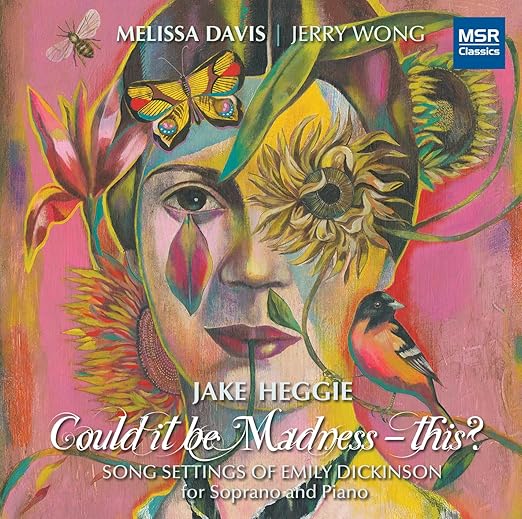 26. JAKE HEGGIE: COULD IT BE MADNESS—THIS? SONG SETTINGS OF EMILY DICKINSON for Soprano and Piano, Melissa Davis, Jerry Wong(MSR Classics)— It is the perplexing and inward-looking elements of the poetry of Emily Dickinson (1830-1886) that continue to make her words so attractive to composers of much later times, including Jake Heggie (born 1961). There are no fewer than 19 Dickinson-based songs for soprano and piano on an MSR Classics disc featuring Melissa Davis and Jerry Wong, and all the words are set with care, utilizing Heggie’s understanding of what he thinks Dickinson was trying to express (although it is worth pointing out that here too there are ongoing academic studies and arguments about the poems’ meanings).
26. JAKE HEGGIE: COULD IT BE MADNESS—THIS? SONG SETTINGS OF EMILY DICKINSON for Soprano and Piano, Melissa Davis, Jerry Wong(MSR Classics)— It is the perplexing and inward-looking elements of the poetry of Emily Dickinson (1830-1886) that continue to make her words so attractive to composers of much later times, including Jake Heggie (born 1961). There are no fewer than 19 Dickinson-based songs for soprano and piano on an MSR Classics disc featuring Melissa Davis and Jerry Wong, and all the words are set with care, utilizing Heggie’s understanding of what he thinks Dickinson was trying to express (although it is worth pointing out that here too there are ongoing academic studies and arguments about the poems’ meanings).

‘Newer Every Day: I. Silence, Melissa Davis (soprano), Jerry Wong (piano), from Jake Heggie’s Could It Be Madness–This? Song Settings of Emily Dickinson
Heggie finds many ways to use Dickinson’s words: The Faces of Love and Newer Every Day, for example, are five-song cycles; The Rose Did Caper on Her Cheek, a world première recording, is a single song; there is also a two-song group, another world première, called Could It Be Madness – This? Heggie organizes the groups around similar (or at least analogous) themes, according to his understanding of the words; the cycles then contrast with individual songs, even when some of the material is nominally related–for instance, The Road to Bethlehem is a single song, while The Faces of Love contains the song As Well as Jesus? Davis and Wong make a fine, sensitive and committed interpretative pair, and when given the chance to shine as an individual, Wong goes beyond accompaniment to add in significant ways to a song’s emotional heft–as, for instance, in the openings of Silence and The First Day’s Night Had Come. Most of the songs are short–the entire CD runs just 47 minutes–but all have a feeling of compression. It is as if their meaning has been squeezed into a limited number of words (as poetry generally does) and the words have then been mixed with illustrative musical material that underlines Dickinson’s thoughts without attempting to expand or comment on them. If there is a flaw in this approach, it is that Heggie’s consistency of interpretative handling of the words results in a good deal of musical sameness: the actual sound of the songs is similar throughout the CD, despite the differences of the words and the emotions they convey. Some listeners will justifiably feel that this shows how thoroughly Heggie has absorbed the poetic world of Dickinson, or at least his interpretation of it; others, however, may wish for a somewhat greater variety of approaches to the verbiage, given the fact that while Dickinson does have a clear style, the feelings she evokes and the words she uses come in more guises than are apparent from their accompaniment here. (Album released in 2023, reserviced in 2024.) Follow this link to the full review in InfoDad.
 27.CADILLAC MAN, Rick Vito (Blue Heart Records)—One of the best yet underappreciated traditional blues guitarists Rick Vito returns with Cadillac Man after a five-year hiatus. Renowned not only for his own material as leader, but Vito has also been the ‘secret weapon’ guitarist for the likes of Bob Seger, Bonnie Raitt, John Mayall, Albert Collins, John Prine, and many more. You’ve heard Vito more than you can possibly imagine. His slide guitar solo on the Seger Chevrolet commercial “Like a Rock” played endlessly from 1991 – 2004.
27.CADILLAC MAN, Rick Vito (Blue Heart Records)—One of the best yet underappreciated traditional blues guitarists Rick Vito returns with Cadillac Man after a five-year hiatus. Renowned not only for his own material as leader, but Vito has also been the ‘secret weapon’ guitarist for the likes of Bob Seger, Bonnie Raitt, John Mayall, Albert Collins, John Prine, and many more. You’ve heard Vito more than you can possibly imagine. His slide guitar solo on the Seger Chevrolet commercial “Like a Rock” played endlessly from 1991 – 2004.
Vito opens with the infectious shuffle “Love Crazy Baby” letting his guitar do the talking for the first few choruses before singing about his gal, accentuating each verse with stinging guitar before launching a killer solo, setting the stage for many more to follow. Vito’s playing is clean, tasty, and impactful. Following the familiar “Two A.M.” Vito hails the automobile on the rocking, chugging title track, laying down a sturdy bassline to underpin his electric axe. The tone shifts somewhat for “Little Sheba” as Vito paints a portrait of a woman that embodies temptation, layering his vocals on the choruses and delivering sweeping, haunting slide guitar lines, reinforced by Mariner’s equally eerie harp.

‘Cadillac Man,’ the official video from Rick Vito’s latest album
Slow burning blues arrive on the love lost ballad “Crying at Midnight,” with the guitar crushing saddened emotion. Vito’s vocals are plainspoken, well-articulated, but lack the emotive qualities that define many blues vocalists. His guitar usually compensates in spades. He revs it up for the highly danceable stomper “Barbeque n’ Baby,” lyrically mixing some cuisine references in with love making while ripping slide leads. Follow this link to the full review by Jim Hynes in Rock and Blues Muse.
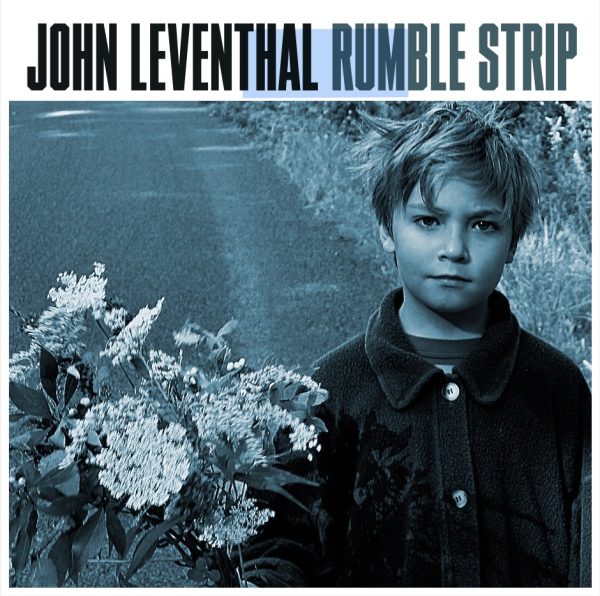 28. RUMBLE STRIP, John Leventhal (RumbleStrip Records)–Across John Leventhal’s 45-year career, he has produced records that won close to 20 Grammy Awards, written songs performed by artists from Joe Cocker to Shawn Colvin, and worked in the studio with musicians as varied as Jackson Browne and Johnny Cash. But until now, he has never occupied the role of “solo artist.” That changes with the release of Rumble Strip.
28. RUMBLE STRIP, John Leventhal (RumbleStrip Records)–Across John Leventhal’s 45-year career, he has produced records that won close to 20 Grammy Awards, written songs performed by artists from Joe Cocker to Shawn Colvin, and worked in the studio with musicians as varied as Jackson Browne and Johnny Cash. But until now, he has never occupied the role of “solo artist.” That changes with the release of Rumble Strip.
The record combines Leventhal’s signature guitar work with his passion for instrumental, classical, soul, country, and jazz-infused improvisational music. The album is assembled like a soundtrack, with instrumentals dominating the record, interspersed by vocal-driven tracks that act like runways and exit ramps. The guitar parts are often layered. They are sharp and never wilt, with a clarity that underscores Leventhal’s great command of the instrument. It’s a sophisticated sound with presence and purpose.
Despite the prevalence of instrumentals, the record’s finest moments are the ones with vocals, by Leventhal and Rosanne Cash, his wife. The vocal songs have a character that feels cautious, dark, and lonesome… Follow this link to the full review by Ray Chelstowski in Stereophile

‘That’s All I Know About Arkansas,’ John Leventhal and Rosanne Cash, from Rumble Strip

1.86.0-SVVEAWTMYPQW5CZ7G65V5KL3DY.0.1-7
29. MEMORY LANE, Wilson Banjo Co. (Pinecastle Records)— Led by banjo player Steve Wilson, who incidentally also designs and builds custom banjos for a growing number of big-name players, this band is basically a duo comprising Wilson and young Sarah Logan. For this latest album they are joined by various combinations of players and singers drawn from a pool of 15 musicians, including Clay Hess, Deanie Richardson, Tony Wray, Josh Raines, Glen Crain, Jason Fraley and Jamie Carter. Sarah Logan, who handles lead vocals on eight of the ten tracks and plays fiddle, is without doubt one of the finest and most versatile young bluegrass vocalists to have emerged in recent years. She can be soulful, bluesy or more demurely emotional, with equal ease, whilst Steve demonstrates why he is held in such high esteem for his banjo playing. The result is a stunning bluegrass collection that runs the gamut from fast-paced toe-tappers to sad-tinged Appalachian ballads, to bluesy and more folksy tunes.

‘Memphis Anymore,’ Wilson Banjo Co., from Memory Lane
Opening with “Sadie Danced A Hole In Her Stocking,” this release immediately comes alive with the rich sounds of Sarah’s joy-filled vocals and Steve’s bright rhythmic banjo picking, joined by Glen Crain’s tuneful Resonator and Sarah also showcasing her superb fiddle work. A fond memoir of carefree days of family get-together’s, in which music and dancing took place late into the evening in the living room, followed early the next day by all heading off to church. In contrast, “The Gavel” tackles the country genre’s rich tradition of mining murder ballad lore, though in this case, it’s told from a female perspective. Follow this link to the full review by Alan Cackett at alancackett.com.
 30. VÃ REVELAÇÃO, Bruno Black & John Finbury (Green Flash Music)– The songwriting career of John Finbury appears to be in eternal, upward flight. On this recording it sounds heavenward with the dreamy-voiced Bruna Black. The paulista’s beguiling, luminous soprano floats limpidly through the air, a thing of evanescent beauty, often gleaming and otherworldly. There may be but a few performances of contemporary Brasilian songs that feel so connected with human emotions, yet gloriously abstracted as the repertoire on this disc, Vã Revelação . If you find yourself lost in the reverie of the eloquent rhapsody of this music, you are certainly not alone.
30. VÃ REVELAÇÃO, Bruno Black & John Finbury (Green Flash Music)– The songwriting career of John Finbury appears to be in eternal, upward flight. On this recording it sounds heavenward with the dreamy-voiced Bruna Black. The paulista’s beguiling, luminous soprano floats limpidly through the air, a thing of evanescent beauty, often gleaming and otherworldly. There may be but a few performances of contemporary Brasilian songs that feel so connected with human emotions, yet gloriously abstracted as the repertoire on this disc, Vã Revelação . If you find yourself lost in the reverie of the eloquent rhapsody of this music, you are certainly not alone.
From the shimmering and silvery glow of [the title song] Vã Revelação, to the gossamer-light fluttering of Noso cais and the crepuscular seduction of Uma noita com você and the molten emotion of Romântico calor, the music of this disc feels like a rapturous journey , following an incredibly special vocalist on a journey through her proverbial heart.

‘Vã Revelação,’ Bruna Black & John Finbury, title track from the new album
The producers of this fine recording have also scored a home run in picking musicians who are fully attuned to the vision and artistry of both the songwriter [Mr Finbury] and the gorgeous-voiced, soulfully infused lyricism of its vocal star, Miss Black. Follow this link to the full review by Raul Da Game in The Canadian Magazine.
 31. PLAYING OUT THE STRING, Arlen Roth (Aquinnah Records)– Coming off his powerhouse summit with bass legend Jerry Jemmott (2013’s Super Soul Session), Arlen Roth, whose own legend spans acoustic and electric blues and pioneering efforts as a guitar and music educator, tones it down to a mostly solo acoustic session (his fifth such outing) on Playing Out the String, with his producer Alex Salzman periodically contributing keyboards. What a sound he realizes with only guitar and voice.
31. PLAYING OUT THE STRING, Arlen Roth (Aquinnah Records)– Coming off his powerhouse summit with bass legend Jerry Jemmott (2013’s Super Soul Session), Arlen Roth, whose own legend spans acoustic and electric blues and pioneering efforts as a guitar and music educator, tones it down to a mostly solo acoustic session (his fifth such outing) on Playing Out the String, with his producer Alex Salzman periodically contributing keyboards. What a sound he realizes with only guitar and voice.
Check out the sonic depth Roth conjures from his 12-string on the cover of “Walk Right In,” on which he manages to mate the ebullient spirit of Gus Cannon’s banjo- and harmonica-driven 1929 original with the strut of the Rooftop Singers’ 1963 pop hit, while adding a conversational vocal quite reminiscent of Mr. Cannon’s own spirited reading. Eleven cuts are about evenly distributed between classic folk and blues tunes, with Roth dipping into the Norman Blake catalogue twice with the intricate fingerpicking of “Randall Collins” and a tender reading of “Church Street Blues.” Follow this link to the full review by David McGee, “Toning It Down,” in Deep Roots.

‘Walk Right In,” Arlen Roth, a casual version of the recorded version on Playing Out the String
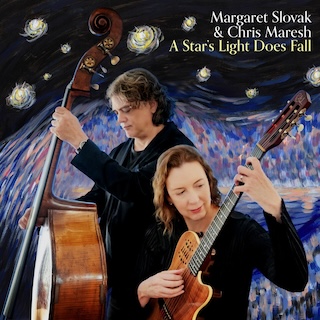 32. A STAR’S LIGHT DOES FALL, Margaret Slovak & Chris Maresh (Slovak Music)– The songs comprising one of 2024’s finest Christmas releases, A Star’s Light Does Fall, feature sensitive dialogues between Margaret Slovak’s nylon string guitar and Chris Maresh’s acoustic bass. Fun fact about this duo: Austin residents both, Ms. Slovak and Mr. Maresh began collaborating little more than a year ago and recorded this album only six months later. In addition to residing in the same town, the two musicians both count Czech musicians as fathers and having grown up in households they were as likely to hear classical music as much as polkas. Nominally jazz musicians, they demonstrate striking improvisational skills throughout, right from the start in opening with a tender dialogue on “O Come, O Come Emmanuel” so subtly rendered in theme and variation passages in which both instruments pronounce tender sentiments with such subtly as to as to take a listener so deeply into their reverie that the song’s 4:28 running time concludes and melts into a quiet, searching take on “I Wonder as I Wander” as if the two songs are one and you’re floating along on a cloud as they completely reimagine the latter without losing any of its, well, wonder. Again, the instruments complement each other, with Ms. Slovak fashioning delicate variations of the melody as Mr. Maresh supports with minimalist bass counterpoint. “What Child is This” finds the taking their concept even farther out, interpolating “Greensleeves” seamlessly into the familiar form, with Ms. Slovak adding some slight dissonance to her explorations as the tune fades out. In slightly less than 15 minutes, the duo has fashioned something truly mesmerizing. It only gets better. Vince Guaraldi’s holiday classic from A Charlie Brown Christmas, “Christmas Time is Here,” albeit in a mellow mood, has a playful ambience in the guitar-bass conversations to and fro, both instruments improvising on the melody line in a way completely empathetic to Guaraldi’s sweet seasonal serenade.
32. A STAR’S LIGHT DOES FALL, Margaret Slovak & Chris Maresh (Slovak Music)– The songs comprising one of 2024’s finest Christmas releases, A Star’s Light Does Fall, feature sensitive dialogues between Margaret Slovak’s nylon string guitar and Chris Maresh’s acoustic bass. Fun fact about this duo: Austin residents both, Ms. Slovak and Mr. Maresh began collaborating little more than a year ago and recorded this album only six months later. In addition to residing in the same town, the two musicians both count Czech musicians as fathers and having grown up in households they were as likely to hear classical music as much as polkas. Nominally jazz musicians, they demonstrate striking improvisational skills throughout, right from the start in opening with a tender dialogue on “O Come, O Come Emmanuel” so subtly rendered in theme and variation passages in which both instruments pronounce tender sentiments with such subtly as to as to take a listener so deeply into their reverie that the song’s 4:28 running time concludes and melts into a quiet, searching take on “I Wonder as I Wander” as if the two songs are one and you’re floating along on a cloud as they completely reimagine the latter without losing any of its, well, wonder. Again, the instruments complement each other, with Ms. Slovak fashioning delicate variations of the melody as Mr. Maresh supports with minimalist bass counterpoint. “What Child is This” finds the taking their concept even farther out, interpolating “Greensleeves” seamlessly into the familiar form, with Ms. Slovak adding some slight dissonance to her explorations as the tune fades out. In slightly less than 15 minutes, the duo has fashioned something truly mesmerizing. It only gets better. Vince Guaraldi’s holiday classic from A Charlie Brown Christmas, “Christmas Time is Here,” albeit in a mellow mood, has a playful ambience in the guitar-bass conversations to and fro, both instruments improvising on the melody line in a way completely empathetic to Guaraldi’s sweet seasonal serenade.

‘Infant Eyes,’ written by Wayne Shorter, performed by Margaret Slovak and Chris Marsh on A Star’s Light Does Fall
It’s not all standards with these musicians. Pleasant surprises surface here and there, one being Wayne Shorter’s lovely “Infant Eyes,” written by Shorter for his infant daughter. Not a Christmas song per se, but Christmas is for children, as Glen Campbell reminded us years ago, and Shorter’s warm melody captures the child’s spirit of wonder at all the world. In the duo’s hands, it fits perfectly into the album’s overarching themes. “It captures the essence of hope and renewal,” Ms. Slovak told Jazz Guitar Today’s Joe Barth, adding: “[It’s] a feeling I wanted to convey during this season.” Follow this link to the full review, “Still, Still, Still,” in Deep Roots.
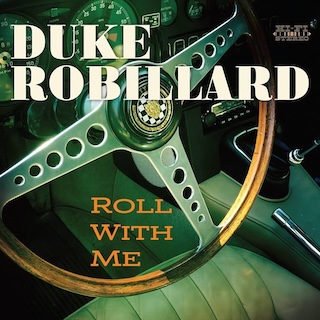 33. ROLL WITH ME, Duke Robillard (Stony Plain)— In 2005 Duke recorded a session for Stony Plain but, for various reasons, it was not released. Ever a busy musician, Duke got involved in other projects and, despite always intending to complete the recording, he has just got around to doing so, almost twenty years on! There were nine tracks laid down at the time and Duke has amplified the set with two previously unreleased tunes from the sessions for Calling All Blues and one from Guitar Groove-A-Rama, making the album up to a dozen great tracks. As there are several sessions involved here, the list of musicians is considerable, but drummer Mark Teixera is on every track and bassist Marty Ballou on eleven. Matt McCabe plays piano on ten tracks, Bruce Bears substituting on the Calling All Blues outtakes and horns are on all tracks, in varying combinations; Doug James and Mark Earley on tenor and baritone sax, Rich Lataille on alto and tenor sax, Doug Woolverton on trumpet, Al Basile on cornet and Pam Murray and Carl Querforth on trombone. Sugar Ray Norcia adds harp to one cut and Chris Cote takes the vocal on two. The material includes four Robillard originals and there are eight covers of mainly classic R&B, including tunes associated with Fats Domino, Gatemouth Brown, Big Joe Turner, Howling Wolf and Muddy Waters.
33. ROLL WITH ME, Duke Robillard (Stony Plain)— In 2005 Duke recorded a session for Stony Plain but, for various reasons, it was not released. Ever a busy musician, Duke got involved in other projects and, despite always intending to complete the recording, he has just got around to doing so, almost twenty years on! There were nine tracks laid down at the time and Duke has amplified the set with two previously unreleased tunes from the sessions for Calling All Blues and one from Guitar Groove-A-Rama, making the album up to a dozen great tracks. As there are several sessions involved here, the list of musicians is considerable, but drummer Mark Teixera is on every track and bassist Marty Ballou on eleven. Matt McCabe plays piano on ten tracks, Bruce Bears substituting on the Calling All Blues outtakes and horns are on all tracks, in varying combinations; Doug James and Mark Earley on tenor and baritone sax, Rich Lataille on alto and tenor sax, Doug Woolverton on trumpet, Al Basile on cornet and Pam Murray and Carl Querforth on trombone. Sugar Ray Norcia adds harp to one cut and Chris Cote takes the vocal on two. The material includes four Robillard originals and there are eight covers of mainly classic R&B, including tunes associated with Fats Domino, Gatemouth Brown, Big Joe Turner, Howling Wolf and Muddy Waters.

‘Boogie Boogie Country Girl,’ written by Doc Pomus, featured by Duke Robillard on Roll With Me
In the liner notes Duke pays tribute to trombonist Pam Murray who features strongly on a loping run through Big Joe Turner’s “I Know You Love Me” before the sole instrumental, “Boogie Uproar”, credited to Duke/Peacock boss Don Robey, but forever associated with Clarence “Gatemouth” Brown. It’s a fun-filled three minutes as the rocking guitar is interspersed with short solos for trombone, piano, alto sax, cornet and baritone sax, Duke even finding time to quote from “Here Comes The Bride”! A second visit to the Big Joe Turner songbook comes in the shape of a swinging, horn-driven version of “Boogie Woogie Country Girl,” originally co-written by Doc Pomus, with whom Duke had the honor to write several songs. The original nine tunes for the 2005 album conclude with two contrasting, but high quality, songs: Duke wrote “Give Me Back My Money” for the session and it’s a tough blues in more of a 60’s style than most of the album. Follow this link to the full review by John Mitchell in Blues Blast Magazine.
 34. ON THE TRAIL WITH THE LONESOME PINES, Hilary Gardner (Anzic Records)– Jazz fans may well recognize silky-voiced Hilary Gardner as a founding member of the close harmony trio Duchess, twice named Vocal Group of the Year by the Jazz Journalists Association (JJA). On her new solo project, On the Trail with the Lonesome Pines, Ms. Gardner takes a bit of a different tack by emphasizing the intimate connections between jazz and western songs. Backed by the superb Lonesome Pines trio, she swings, sways and swoons through a dozen vintage western-oriented chestnuts referencing both the cowboy’s solitary way and its inseparable connection to the natural world’s allure, romance and poetry. What has jazz to do with any of this? Consider that Frank Loesser co-wrote “Jingle Jangle Jingle (I Got Spurs),” here given a jaunty shuffle with Justin Poindexter adding a tasty Les Paul-like guitar solo to the proceedings. Benny Carter and Gene DePaul penned the lyrics to Ellla Mae Morse’s 1942 million selling “Cow Cow Boogie,” appropriately rendered with a frisky, sultry swing. But especially on beautiful ballads (notably the languorous “Twilight on the Trail,” dating from 1936), Ms. Gardner’s delicate, winsome approach rises into an exalted realm of feeling and experience common only to the finest interpretive singers. Saddle up! –David McGee
34. ON THE TRAIL WITH THE LONESOME PINES, Hilary Gardner (Anzic Records)– Jazz fans may well recognize silky-voiced Hilary Gardner as a founding member of the close harmony trio Duchess, twice named Vocal Group of the Year by the Jazz Journalists Association (JJA). On her new solo project, On the Trail with the Lonesome Pines, Ms. Gardner takes a bit of a different tack by emphasizing the intimate connections between jazz and western songs. Backed by the superb Lonesome Pines trio, she swings, sways and swoons through a dozen vintage western-oriented chestnuts referencing both the cowboy’s solitary way and its inseparable connection to the natural world’s allure, romance and poetry. What has jazz to do with any of this? Consider that Frank Loesser co-wrote “Jingle Jangle Jingle (I Got Spurs),” here given a jaunty shuffle with Justin Poindexter adding a tasty Les Paul-like guitar solo to the proceedings. Benny Carter and Gene DePaul penned the lyrics to Ellla Mae Morse’s 1942 million selling “Cow Cow Boogie,” appropriately rendered with a frisky, sultry swing. But especially on beautiful ballads (notably the languorous “Twilight on the Trail,” dating from 1936), Ms. Gardner’s delicate, winsome approach rises into an exalted realm of feeling and experience common only to the finest interpretive singers. Saddle up! –David McGee

‘Twilight on the Trail,’ Hilary Gardner, from On the Trail With the Lonesome Pines
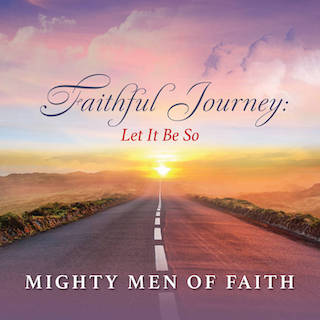 35. FAITHFUL JOURNEY: LET IT BE SO, Mighty Men of Faith (Independent)– For those who like sweet singing gospel quartets who minister in a Whispers/Spinners/Dramatics style, the Mighty Men of Faith deliver. Their new album, the eleven-track Faithful Journey: Let It Be So, is no different. It’s steeped in smooth and soulful harmonies, sweet falsetto lead singing, and electronic beats. Not to be confused with the Mighty Power of Faith, a hard-singing (and long-gone) Chicago-based quartet, the Mighty Men of Faith has for years worked in a ‘70s/’80s soul vibe. Its members include Wendell Basey, Rev. Richard Hayes, Charles Johnson, and Rev. Ed Prothro-Harris. If other quartets run the aisles, Mighty Men of Faith slow swagger down them. … “Don’t Worry,” “Taste and See,” “Let It Be So,” and “Thru the Fire” illustrate the album’s overarching theme of reliance on God to deal with life’s travails. As if to summarize, “Walk With the Lord” reiterates how belief in Christ is key to overcoming life’s dangers. While not all the songs pierce the heart with the same satisfying arrow as “Don’t Worry,” listeners who long for the days of spirituality bathed in sweet soul will find it with Mighty Men of Faith. Follow this link to the full review by Bob Marovich in Deep Roots.
35. FAITHFUL JOURNEY: LET IT BE SO, Mighty Men of Faith (Independent)– For those who like sweet singing gospel quartets who minister in a Whispers/Spinners/Dramatics style, the Mighty Men of Faith deliver. Their new album, the eleven-track Faithful Journey: Let It Be So, is no different. It’s steeped in smooth and soulful harmonies, sweet falsetto lead singing, and electronic beats. Not to be confused with the Mighty Power of Faith, a hard-singing (and long-gone) Chicago-based quartet, the Mighty Men of Faith has for years worked in a ‘70s/’80s soul vibe. Its members include Wendell Basey, Rev. Richard Hayes, Charles Johnson, and Rev. Ed Prothro-Harris. If other quartets run the aisles, Mighty Men of Faith slow swagger down them. … “Don’t Worry,” “Taste and See,” “Let It Be So,” and “Thru the Fire” illustrate the album’s overarching theme of reliance on God to deal with life’s travails. As if to summarize, “Walk With the Lord” reiterates how belief in Christ is key to overcoming life’s dangers. While not all the songs pierce the heart with the same satisfying arrow as “Don’t Worry,” listeners who long for the days of spirituality bathed in sweet soul will find it with Mighty Men of Faith. Follow this link to the full review by Bob Marovich in Deep Roots.

‘Don’t Worry,’ Might Men of Faith, from Faithful Journey: Let It Be So
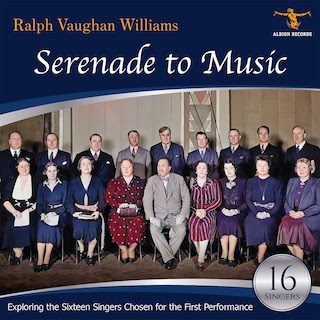 36. RALPH VAUGHAN WILLIAMS: SERENADE TO MUSIC, Exploring the Sixteen Singers Chosen for the First Performance (Albion Records)– Ralph Vaughan Williams’ Serenade to Music has become rightly become iconic and on this disc from Albion Records the original 1938 recording is explored from a different angle. Written for 16 soloists and orchestra, the text is an adaptation of the discussion about music and the music of the spheres in Act V, Scene 1 of Shakespeare’s The Merchant of Venice (see lyrics below). This Albion release is the original recording with a group of Britain’s foremost soloists of the day–Isobel Baillie, Elise Suddaby, Eva Turner, Stiles-Allen, Muriel Brunskill, Astra Desmond, Margaret Balfour, Mary Jarrod, Walter Widdop, Parry Jones, Frank Titterson, Heddle Nash, Roy Henderson, Robert Easton, Harold Williams, and Norman Allin–conducted by Sir Henry Wood with the BBC Symphony Orchestra. Serenade to Music is a little more than 14 minutes in length, so the CD is fleshed out with recordings made by the eminent vocalists individually before and after the Serenade to Music session. One extra track features Keith Falkner, who was unavailable for the original recording.
36. RALPH VAUGHAN WILLIAMS: SERENADE TO MUSIC, Exploring the Sixteen Singers Chosen for the First Performance (Albion Records)– Ralph Vaughan Williams’ Serenade to Music has become rightly become iconic and on this disc from Albion Records the original 1938 recording is explored from a different angle. Written for 16 soloists and orchestra, the text is an adaptation of the discussion about music and the music of the spheres in Act V, Scene 1 of Shakespeare’s The Merchant of Venice (see lyrics below). This Albion release is the original recording with a group of Britain’s foremost soloists of the day–Isobel Baillie, Elise Suddaby, Eva Turner, Stiles-Allen, Muriel Brunskill, Astra Desmond, Margaret Balfour, Mary Jarrod, Walter Widdop, Parry Jones, Frank Titterson, Heddle Nash, Roy Henderson, Robert Easton, Harold Williams, and Norman Allin–conducted by Sir Henry Wood with the BBC Symphony Orchestra. Serenade to Music is a little more than 14 minutes in length, so the CD is fleshed out with recordings made by the eminent vocalists individually before and after the Serenade to Music session. One extra track features Keith Falkner, who was unavailable for the original recording.
All the singers had a long association with Sir Henry Wood and the premiere of Serenade to Music took place on 5 October 1938 at the Queen’s Hall, and the program included not only RVW’s piece but Rachmaninoff as the soloist in his Piano Concerto No. 2. Ten days later, the singers reassembled at Abbey Road Studios to record the work. It would not be the last time that they performed the work. Isobel Baillie in her autobiography records a post-war performance with the original singers, with Baillie joking about the strain on the stage as all were significantly heavier than they had been in 1938! Follow this link to the full review by Robert Hugill, “Pure, Unrepeatable Magic,” in Deep Roots.

‘Heavenly Vision,’ Robert Easton and Heddie Nash, a solo recording by singers appearing on the original Serenade to Music, included on the remastered 2024 release.
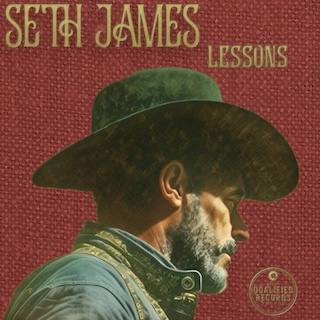 37. LESSONS, Seth James (Qualified Records)— The other great element of Texas music is the mashing of different musical genres to create something distinctly original, all-American and yet also entirely Texan. Think Doug Sahm. Think Lyle Lovett. Think Delbert McClinton, whose blend of blues, country, R&B, soul, rock and funk caused Rolling Stone magazine to dub him “the founding father of Americana.” Delbert retired from touring at the age of 80 in 2021 and released his latest studio album, Outdated Emotion, in 2022. His legacy however remains undiminished.
37. LESSONS, Seth James (Qualified Records)— The other great element of Texas music is the mashing of different musical genres to create something distinctly original, all-American and yet also entirely Texan. Think Doug Sahm. Think Lyle Lovett. Think Delbert McClinton, whose blend of blues, country, R&B, soul, rock and funk caused Rolling Stone magazine to dub him “the founding father of Americana.” Delbert retired from touring at the age of 80 in 2021 and released his latest studio album, Outdated Emotion, in 2022. His legacy however remains undiminished.
Texan troubadour Seth James has now released Lessons, an 11-track tribute to Delbert, recording a delightful mix of some of McClinton’s better-known songs with one or two lesser-known gems. For this project, James linked up with keyboardist, guitarist, producer and engineer Kevin McKendree, who worked with Delbert for over 25 years, together with other McClinton band alumni, drummer Lynn Williams and bassist Steve Mackey. He also brought on board Rob McNelley on guitar, Vinnie Ciesielski, John Hinchey and Jim Hoke on horns and backing vocalists Nick Jay and Alice Spencer. Together, they perfectly capture the greasy, funky, deeply emotional feel of McClinton’s best bands. After a poetic solo voice reading of “The Glamour Of Life” which acts as a ready reminder of McClinton’s stunning appreciation of language, the album kicks into “Honky Tonkin’ (I Guess I Done Me Some)” from Delbert’s 1975 album, Victim Of Life’s Circumstances, with McKendree’s engineering skills producing a significantly more beefed up sound than the original. James’s voice fits McClinton’s music perfectly and the band nail the required sound on every track. Follow this link to the full review by Rhys Williams in Blues Blast Magazine.

‘Honky Tonkin’ (I Guess I Done Me Some),’ Seth James, from Lessons
 38. THE PATH OF A TEAR, Jo Harrop (Lateralize Records)—Since releasing her acclaimed debut album, Weathering the Storm, in 2018, the earthy-voiced British jazz singer-songwriter Jo Hallop (born in Durham in northeast England) has year by year, album by album, gained more traction and more acclaim in the jazz world to the point where she is now, four albums into her career, regarded as being in the top tier of contemporary jazz singers and acknowledged as a gifted songwriter as well. The Path of a Tear, her first album recorded in the U.S. (at Village Recorders, Studio B, in Los Angeles), is a major step forward on several fronts, not the least being the presence of four-time Grammy winning producer Larry Klein behind the board and a host of top jazz musicians joining the sessions. Klein has an estimable track record producing female singer-songwriters, having worked with, among others, Joni Mitchell (his ex-wife), Madeleine Peyroux and, for three albums (including a Grammy winning one), Melody Gardot. Klein and Hallop prove to be a good match, with the producer fashioning a sensitive soundscape for Hallop’s incisive songs detailing romantic misfortunes of the first order. Thoses songs, every bit as intimate as Gardot’s, find her fully present in their narratives, shading her deep tones just so to emphasize an arc of feeling rising or falling according to the fates she’s confronting. Subtle backing is provided by a highly lettered quartet of guitar, drums/percussion, piano/Rhodes/B3, and bass (Klein himself is on bass on three tracks).
38. THE PATH OF A TEAR, Jo Harrop (Lateralize Records)—Since releasing her acclaimed debut album, Weathering the Storm, in 2018, the earthy-voiced British jazz singer-songwriter Jo Hallop (born in Durham in northeast England) has year by year, album by album, gained more traction and more acclaim in the jazz world to the point where she is now, four albums into her career, regarded as being in the top tier of contemporary jazz singers and acknowledged as a gifted songwriter as well. The Path of a Tear, her first album recorded in the U.S. (at Village Recorders, Studio B, in Los Angeles), is a major step forward on several fronts, not the least being the presence of four-time Grammy winning producer Larry Klein behind the board and a host of top jazz musicians joining the sessions. Klein has an estimable track record producing female singer-songwriters, having worked with, among others, Joni Mitchell (his ex-wife), Madeleine Peyroux and, for three albums (including a Grammy winning one), Melody Gardot. Klein and Hallop prove to be a good match, with the producer fashioning a sensitive soundscape for Hallop’s incisive songs detailing romantic misfortunes of the first order. Thoses songs, every bit as intimate as Gardot’s, find her fully present in their narratives, shading her deep tones just so to emphasize an arc of feeling rising or falling according to the fates she’s confronting. Subtle backing is provided by a highly lettered quartet of guitar, drums/percussion, piano/Rhodes/B3, and bass (Klein himself is on bass on three tracks).

A live version of Steve Earle’s ‘Goodbye,’ recorded at The Village Studios in Los Angeles. Backing Jo hallop are Anthony Wilson (guitar), producer Larry Klein (bass), Jeff Babko (piano), Denny Weston (drums). The studio version is on The Path of a Tear, Ms. Hallop’s fourth album.
With clean, clear enunciation, Ms. Harrop offers measured readings of eight original songs (co-writes all) and three covers, but her cool demeanor is but a façade, as her masterful use of tone and range speaks volumes about the often-roiling emotions animating her narratives. Consider gems such as “Too Close to the Sun,” a bittersweet post-mortem of a failed relationship between two people who couldn’t keep the flame but rather got consumed by it (“we flew too close to the sun/like angels into ashes/even angels make mistakes/broken wings, torn and shattered”), with Anthony Wilson’s introspective guitar solo mirroring the singer’s lamentation. The dirge-like blues of “A Love Like This,” with piano and B3 enhancing the funereal atmosphere, actually frames Ms. Harrop’s determination to save a troubled relationship. “So just find a way to come back to me/and we’ll start again if what’s meant to be/a love like this/don’t let it go…” she offers in a brooding tone, dipping into her lower register to emphasize her resolve to make things right again. Covers include an intriguing noir-ish take on Leonard Cohen’s irony-rich “Traveling Light,” an ode to the advantages of carrying less emotional baggage going forward by leaving a lover behind, delivered with an airy, carefree attitude seemingly oblivious to the damage left in its wake. Steve Earle rarely gets his due for all the touching love songs he’s written, but Ms. Harrop does great justice to one of his best, the touching (actually Cohen-ish) “Goodbye,” with a tinge of country flavor in another succinct Anthony Wilson solo on the semi-hollow body guitar and strictly circumscribed supporting commentary provided by percussion and piano behind a measured, probing, emotional reading—one of the finest Earle covers yet, thanks to a vocalist perfectly attuned to the songwriter’s intent. –David McGee
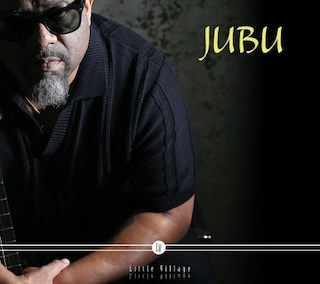 39. JUBU, Jubu Smith (Little Village)—It’s likely fair to say more people have heard guitarist par excellence Jubu Smith than have heard of him. He did emerge in the early ‘90s as the guitarist for Tony! Toni! Toné! during the group’s most productive run but his most extensive credits are as a studio guitarist for some major household names in smooth jazz (the Georges Duke and Benson), R&B (Luther Vandross—who would also qualify as gospel; Mary J. Blige, among others). He’s also fronted his own soul blues bands (Legally Blynd and The Jubu Smith Experience, whose members included his brother Erik “Pik Funk” Smith). In 2024 he ventured onto yet another path, signging with the Little Village label and crafting a solo a dedicated “guitar groove” instrumental album bearing only his baptismal name, Jubu.
39. JUBU, Jubu Smith (Little Village)—It’s likely fair to say more people have heard guitarist par excellence Jubu Smith than have heard of him. He did emerge in the early ‘90s as the guitarist for Tony! Toni! Toné! during the group’s most productive run but his most extensive credits are as a studio guitarist for some major household names in smooth jazz (the Georges Duke and Benson), R&B (Luther Vandross—who would also qualify as gospel; Mary J. Blige, among others). He’s also fronted his own soul blues bands (Legally Blynd and The Jubu Smith Experience, whose members included his brother Erik “Pik Funk” Smith). In 2024 he ventured onto yet another path, signging with the Little Village label and crafting a solo a dedicated “guitar groove” instrumental album bearing only his baptismal name, Jubu.
A high-concept project, Jubu teams Jubu with but two other all-universe players: the great producer-guitarist Charlie Hunter (he of the multiple Grammy nominations, who here plays bass and guitar simultaneously on a custom eight-string model) and Grammy winning drummer Calvin Napier, notably of MAZE with Frankie Beverly fame. If theirs is not the most perfect example of the KISS (Keep It Simple, Stupid) philosophy, it’s at least near the top of the list. It’s a guitar groove album—no better description could be had. The 8:03 smooth jazz groove of “EG is Here” is a great showcase of Jubu’s mastery of tone and texture, with some scintillating trebly single-string formulations interspersed with virtuosic atmospheric flurries adding intensity to the track with Hunter deftly filling in the spaces and Napier keeping a percolating rhythm attack steady as she goes. One of the more humorous moments comes with “Kwik-Way Nostalgia,” in which Jubu and Hunter plays with scales, tempo, textures and effects over the course of a languid, groove-centric 7:32 exercise. One supposes this might put a Kwik-Way visit into a musical setting, since the convenience store does lend itself to meandering around and collecting snacks and drinks nutritionists will tell you you don’t really need but are in fact life sustaining. (You read it here first!) At eight minutes-plus “Totally Convicted” is the album’s longest tune, during which Jubu crafts a mellow, late-night mood out of single-string runs, cascades of fleet-fingered outbursts and moaning slide passages while ceding the stage to Hunter at one point for a complementary rich-toned solo of his own. In many ways the album’s most soulful moment, “Jubu’s Poem” is 6:37 of deeply introspective emotional exposition—by turns tender, thoughtful, longing—that shifts gears at the five-minute mark into an aggressive fusillade of rapid-fire solo soloing up and down the neck with Hunter’s burbling bass and Napier’s drum volleys and cymbal splashes providing complementary commentary. Celebrate the groove and be set free. –David McGee

‘Jubu’s Poem,’ Jubu Smith (guitar) with Charlie Hunter (bass) and Calvin Napier (drums), from Jubu
 40. STRUCK DOWN, The Fabulous Thunderbird (Stony Plain)— Since their foundation at the legendary Antone’s in Austin in 1974, The Fabulous Thunderbirds have endured under the direction of harp player Kim Wilson as one of the best bands in America. And they celebrate their 50th anniversary with this disc. It’s a star-studded effort that’s as contemporary as any album they’ve done yet.
40. STRUCK DOWN, The Fabulous Thunderbird (Stony Plain)— Since their foundation at the legendary Antone’s in Austin in 1974, The Fabulous Thunderbirds have endured under the direction of harp player Kim Wilson as one of the best bands in America. And they celebrate their 50th anniversary with this disc. It’s a star-studded effort that’s as contemporary as any album they’ve done yet.
Sure, Jimmie Vaughan, Keith Ferguson, Duke Robillard, Gene Taylor, Kid Ramos, Willie Campbell, Jimi Bott, Richard Innes, Kirk Fletcher, Nick Curran and a host of others are no longer in the lineup, but Kim’s current crew is as tight as a band can get with Johnny Moeller on guitar, Bob Welsh on keys and guitar, Rudy Albin Petschauer on percussion and Steven Kirsty doubling on saxophone and bass.

‘Nothing in Rambling,’ The Fabulous Thunderbirds featuring Bonnie Raitt, Ken’ Mo’, Taj Mahal and Mick Fleetwood, from Struck Down
Recorded in New Jersey and Hamilton, Ont., this album came about after Canadian six-string giant Steve Strongman approached Wilson in the hope of paring up to write some tunes. Their chemistry proved so potent, Kim says, that they’d composed five songs in the first three days and 12 more in the three days that followed. Ten of those compositions populate this album, which includes fretwork from Steve on eight of the cuts. Guest appearances from a host of heavyweights makes the CD even more special. Both Bonnie Raitt, Keb’ Mo’ and Billy Gibbons contribute guitar and vocals, Terrance Simien adds accordion and washboard and Mick Fleetwood sits in on drums, too. Add Taj Mahal’s voice, guitar from Elvin Bishop and Dean Shott, background vocals from Chris Ayries and percussion from Rob Szabo and you’ve got something special. The Fabulous Thunderbirds have released dozens of albums in the past, but this one might just be their best! Follow this link to the full review by Marty Gunther in Blues Blast Magazine.
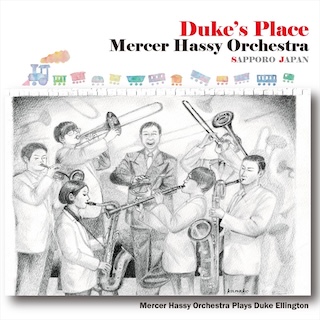
41. DUKE’S PLACE, Mercer Hassy Orchestra (Mercer Hassy Records)— If much of the music on Duke’s Place seems only vaguely familiar, that is probably because composer-arranger Mercer Hassy has taken more than a dozen songs written and/or made popular by Duke Ellington and his orchestra and turned them, for better or worse, inside out and upside down, playing with melody, harmony and rhythm but always with a clear purpose in mind, and presenting for the most part Ellington as you no doubt have never heard him before.
Luckily, there is far more better than worse here, thanks largely to Hassy’s colorful charts and the ardor of his Sapporo, Japan-based orchestra, which does its best to keep the Ellington flame alive and burning brightly. Hassy (born Masahide Hashimoto) has studied the music of Ellington and Billy Strayhorn for decades and knew exactly what colors and brushes to use when the time came to add a fresh coat ofpaint. For the ballad “Satin Doll,” that included a funky rhythmic flooring; for “Don’t Get Around Much Anymore,” a Motown groove; for a medley of “Prelude to a Kiss” and “In My Solitude,” a choral arrangement with vocals (and sans orchestra) and so on.

‘Duke’s Place,’ Mercer Hassy Orchestra, from Duke’s Place
The program covers the years from 1928 (the trad-flavored “Hot and Bothered”) to 1956 (Strayhorn’s melodious “U.M.M.G”), opening in 1933 with “Daybreak Express,” whose exuberant rumble mirrors a freight train in full throttle right down to the horn, bells and whistles while spotlighting the ensemble’s remarkably flexible saxophone section. Follow this link to the full review by Jack Bowers in All About Jazz.
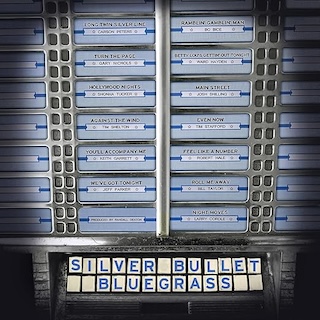 42. SILVER BULLET BLUEGRASS, Various Artists (Lonesome Day Records)—First, this unlikely bluegrass tribute to the music of Detroit-centric Midwest rocker Bob Seger gets the attention simply for existing. Producer Randall Deaton recorded initial tracks in 2012 only to shelve it to focus on other projects looming at the time. Over time the Seger project gained adherents in engineer Jimmy Nutt and Grammy winning artist-songwriter Gary Nichols, and Deaton, his passion reignited, was determined to “take this record to the finish line,” he said. While acknowledging the difficult task of replicating in bluegrass form what one critic termed Seger’s “drive and determination,” the assembled artists succeeded in large part in reimagining a baker’s dozen Seger tunes ranging from his career launching ‘60s classic “Ramblin’ Gamblin’ Man” (nice work by Bo Bice on that burner) through the heart of Seger’s hitmaking legacy. Tim Shelton offers nothing less than an interpretive masterpiece on a backwoods reading of “Against the Wind,” a real beauty swaddled in fiddle with evocative, weeping dobro punctuations supporting Shelton’s sensitive vocal; similarly, Larry Cordle hits the mark dead-on in his dramatic bluegrass ballad reading of “Night Moves,” heavy on dobro slides and acoustic guitar, the end result of which makes it seems like much more is at stake than “losing those teenage blues.” Fleet-fingered banjo propulsion and rambunctious fiddle support energize Shannon Tucker’s hearty romp through “Hollywood Nights”; equally striking, and arguably the most surprising track on the disc, Ward Hayden and band take “Betty Lou’s Getting’ Out Tonight” into out-and-out rockabilly territory complete with a thumping acoustic bass solo. A dream realized for producer Deaton has resulted in one of the year’s most memorable bluegrass outings. –David McGee
42. SILVER BULLET BLUEGRASS, Various Artists (Lonesome Day Records)—First, this unlikely bluegrass tribute to the music of Detroit-centric Midwest rocker Bob Seger gets the attention simply for existing. Producer Randall Deaton recorded initial tracks in 2012 only to shelve it to focus on other projects looming at the time. Over time the Seger project gained adherents in engineer Jimmy Nutt and Grammy winning artist-songwriter Gary Nichols, and Deaton, his passion reignited, was determined to “take this record to the finish line,” he said. While acknowledging the difficult task of replicating in bluegrass form what one critic termed Seger’s “drive and determination,” the assembled artists succeeded in large part in reimagining a baker’s dozen Seger tunes ranging from his career launching ‘60s classic “Ramblin’ Gamblin’ Man” (nice work by Bo Bice on that burner) through the heart of Seger’s hitmaking legacy. Tim Shelton offers nothing less than an interpretive masterpiece on a backwoods reading of “Against the Wind,” a real beauty swaddled in fiddle with evocative, weeping dobro punctuations supporting Shelton’s sensitive vocal; similarly, Larry Cordle hits the mark dead-on in his dramatic bluegrass ballad reading of “Night Moves,” heavy on dobro slides and acoustic guitar, the end result of which makes it seems like much more is at stake than “losing those teenage blues.” Fleet-fingered banjo propulsion and rambunctious fiddle support energize Shannon Tucker’s hearty romp through “Hollywood Nights”; equally striking, and arguably the most surprising track on the disc, Ward Hayden and band take “Betty Lou’s Getting’ Out Tonight” into out-and-out rockabilly territory complete with a thumping acoustic bass solo. A dream realized for producer Deaton has resulted in one of the year’s most memorable bluegrass outings. –David McGee

‘Against the Wind,’ vocal by Tim Shelton, from Silver Bullet Bluegrass
 43. TRIO, Andy Pratt (Thrift Girl Records)— From the cascade of arpeggiated chords introducing the Gershwins’ “Soon” at this album’s start to the ebullient tenderness and genial vocal defining the closing offering of Bacharach-David’s “Something Big,” guitarist-vocalist Andy Pratt, working in a trio setting with fellow veteran Chicago jazz masters Joe Policastro (bass) and Phil Gratteau (drums), brings the sunshine at every turn. Cool, calm and collected throughout, these three musicians demonstrate the gift of being so good as to mask the complexity of their instrumental discourses in a laid-back exercise remarkable for its sustained mellow vibe. Among jazz trios Pratt’s is closer in style and attack to that of John Pizzarelli. Their tight, evocative, subdued approach serves to put a fresh sheen on some familiar and not-so-familiar pop, Latin and Great American Songbook chestnut. On the playful side, Pratt leads the trio through a frisky rendition of Perez Prado’s 1958 certified gold Mambo hit, “Patricia,” artfully deploying lush chords and teasing single-string variations of the catchy theme over Gratteau’s mischievous fills and cymbal work. Follow this link to the full review, “Jazz Trios: Ascending,” in Deep Roots.
43. TRIO, Andy Pratt (Thrift Girl Records)— From the cascade of arpeggiated chords introducing the Gershwins’ “Soon” at this album’s start to the ebullient tenderness and genial vocal defining the closing offering of Bacharach-David’s “Something Big,” guitarist-vocalist Andy Pratt, working in a trio setting with fellow veteran Chicago jazz masters Joe Policastro (bass) and Phil Gratteau (drums), brings the sunshine at every turn. Cool, calm and collected throughout, these three musicians demonstrate the gift of being so good as to mask the complexity of their instrumental discourses in a laid-back exercise remarkable for its sustained mellow vibe. Among jazz trios Pratt’s is closer in style and attack to that of John Pizzarelli. Their tight, evocative, subdued approach serves to put a fresh sheen on some familiar and not-so-familiar pop, Latin and Great American Songbook chestnut. On the playful side, Pratt leads the trio through a frisky rendition of Perez Prado’s 1958 certified gold Mambo hit, “Patricia,” artfully deploying lush chords and teasing single-string variations of the catchy theme over Gratteau’s mischievous fills and cymbal work. Follow this link to the full review, “Jazz Trios: Ascending,” in Deep Roots.

‘Patricia,’ Perez Prado’s Mambo hit from 1958, as performed by Andy Pratt on Trio
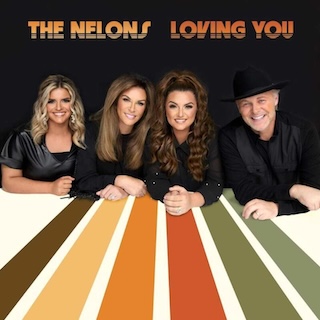 44. LOVING YOU, The Nelons (Daywind Records)–Listening to the Nelons’ Loving You is a bittersweet experience, knowing it is the final album to feature Kelly Nelon Clark, Amber Nelon Kistler, and Jason Clark, three of the four group members killed in a July 26 plane crash that also claimed the lives of Amber’s husband Nathan Kistler and friends Melodi Hodges, Larry Haynie, and Melissa Haynie.
44. LOVING YOU, The Nelons (Daywind Records)–Listening to the Nelons’ Loving You is a bittersweet experience, knowing it is the final album to feature Kelly Nelon Clark, Amber Nelon Kistler, and Jason Clark, three of the four group members killed in a July 26 plane crash that also claimed the lives of Amber’s husband Nathan Kistler and friends Melodi Hodges, Larry Haynie, and Melissa Haynie.
What should have been a celebratory album launch is now a memorial tribute to a beloved southern gospel group.
The album’s overarching theme is love in its various manifestations. “That’s What Love Is” is a country pop song about showing love by helping one another. Fiddle and other string band instruments weave through the tight harmonies and lovely melody. The musicians sound as comfortable backing Travis Tritt as the Nelons. The title track is a gently rhythmic ballad about God’s love for each of us long before we came into being. “Three Nails Instead” is an ode to Jesus’s ultimate love for humankind. “God Won’t” is a paean to the constancy of the Most High, whose love is such that he won’t leave us even when others do. Follow this link to the full review by Bob Marovich in Deep Roots.

‘He Looked Beyond My Faults,’ The Melons, from Loving You
 45. LIVE IN THE PARLOUR, Christine Santelli & Heather Hardy (www.christinesantelli.com)– A native of upstate New York and long-time resident of Hoboken, NJ, Christine Santelli is a well-established blues artist who has expanded her audience beyond the tri-state area into other parts of the country where blues is welcomed but her meat and potatoes remains the venues in and around her home turf. She’s gained additional notice in recent years for Bettye Lavette having covered original Santeli tunes…. In recent years, while still working with her band, Ms. Santelli has struck up a musical partnership with fiddler Heather Hardy, who comes by way of the punk band the False Prophets, then the Sam Taylor band, then her own Li’l Mama Band, all which lead to her induction into the Arizona Blues Hall of Fame in 2000. Ms. Hardy, who also sits in with Ms. Santelli’s full band on occasion, brings the kind of deep musical vocabulary Ms. Santelli’s songs deserve. The beautiful music they make together is captured in the set released as Live in the Parlour, the release of which came with a notice from Ms. Santelli of a new studio album being the works. Only one of the 12 songs here is a cover, it being a romp through the venerable “Iko Iko” that draws in the audience and gives room for Ms. Hardy to tear it up with some lively Cajun-flavored bow work. The remaining 11 tunes are Santelli originals, with the clear highlights being three tunes from Any Better Time, a towering entry from Tales From the Red Room and a gem from Limelight ’69, “Poor Me,” originally intended for Dragonfly but ultimately excised. These were all band arrangements in their original incarnations, but here they become intimate singer-songwriter performances that underscore the craftmanship informing the writing and the seamless way Ms. Hardy becomes a complementary voice to Ms. Santelli’s with her artfully and empathetically designed solos. Follow this link to the full review, “In Heavy Rotation: LIVEr Than Ever,” in Deep Roots.
45. LIVE IN THE PARLOUR, Christine Santelli & Heather Hardy (www.christinesantelli.com)– A native of upstate New York and long-time resident of Hoboken, NJ, Christine Santelli is a well-established blues artist who has expanded her audience beyond the tri-state area into other parts of the country where blues is welcomed but her meat and potatoes remains the venues in and around her home turf. She’s gained additional notice in recent years for Bettye Lavette having covered original Santeli tunes…. In recent years, while still working with her band, Ms. Santelli has struck up a musical partnership with fiddler Heather Hardy, who comes by way of the punk band the False Prophets, then the Sam Taylor band, then her own Li’l Mama Band, all which lead to her induction into the Arizona Blues Hall of Fame in 2000. Ms. Hardy, who also sits in with Ms. Santelli’s full band on occasion, brings the kind of deep musical vocabulary Ms. Santelli’s songs deserve. The beautiful music they make together is captured in the set released as Live in the Parlour, the release of which came with a notice from Ms. Santelli of a new studio album being the works. Only one of the 12 songs here is a cover, it being a romp through the venerable “Iko Iko” that draws in the audience and gives room for Ms. Hardy to tear it up with some lively Cajun-flavored bow work. The remaining 11 tunes are Santelli originals, with the clear highlights being three tunes from Any Better Time, a towering entry from Tales From the Red Room and a gem from Limelight ’69, “Poor Me,” originally intended for Dragonfly but ultimately excised. These were all band arrangements in their original incarnations, but here they become intimate singer-songwriter performances that underscore the craftmanship informing the writing and the seamless way Ms. Hardy becomes a complementary voice to Ms. Santelli’s with her artfully and empathetically designed solos. Follow this link to the full review, “In Heavy Rotation: LIVEr Than Ever,” in Deep Roots.

‘Good Day for a Hangin’,’ Christine Santelli and Heather Hardy, from Live in the Parlour
 46. HEROES AND FRIENDS, Daniel Grindstaff (Bonfire Music Group)— Since he was just eighteen years old, Daniel Grindstaff has played banjo for numerous top acts in bluegrass music, including Jim & Jesse, Bobby Osborne, Marty Raybon, and David Davis among others. On the aptly named, Heroes and Friends, Grindstaff has surrounded himself with first rate pickers and singers for a collection of his own original tunes and interpretations of his favorite songs, all with an eye towards those he has looked up to in music.
46. HEROES AND FRIENDS, Daniel Grindstaff (Bonfire Music Group)— Since he was just eighteen years old, Daniel Grindstaff has played banjo for numerous top acts in bluegrass music, including Jim & Jesse, Bobby Osborne, Marty Raybon, and David Davis among others. On the aptly named, Heroes and Friends, Grindstaff has surrounded himself with first rate pickers and singers for a collection of his own original tunes and interpretations of his favorite songs, all with an eye towards those he has looked up to in music.
The album kicks off with “Finnland,” a tune which Daniel named after his son, Finn. Played in the spirit of the great old time fiddle/banjo combination, this track features Andy Leftwich on fiddle along with Jesse Brock on mandolin, Trey Hensley on guitar, and Kent Blanton on bass.

‘Three Arrows,’ featuring Daniel Grindstaff (banjo), Andy Leftwich (mandolin), Stephen Burrell (fiddle), Trey Hensley (guitar) and Kent Blanton (bass), from Heroes and Friends
“Forever Young” is one of several highlights of this project. Taken from the repertoire of Rod Stewart, this track features incredible vocals from Paul Brewster and Dolly Parton. Along with Grindstaff on banjo and harmony vocals, instrumental support is provided by Leftwich on mandolin, Hensley on guitar, Blanton on bass, as well as Josh Swift on resophonic guitar and percussion, Stephen Burwell on fiddle, and Derek Deakins as the string section. Much like the albums opener, “Three Arrows” is a tune written for Grindstaff’s sons, Owen and Finn. It also serves as the symbol for Down Syndrome, a genetic disorder caused by an extra chromosome. This straightforward piece serves as a fitting conclusion to this album. Follow this link to the full review by Braeden Paul in Bluegrass Today.
47. MY DADDY’S DAD, Alex Miller (EP, Billy Jam Records)— With only five tracks and most songs clocking in at around three minutes, this latest release from Kentucky country singer Alex Miller is a bit short—at least for listeners who are always appreciative of finely-honed vocals and solid traditional country. However, what is here is good stuff. Alex’sapproach throughout makes a case for the timelessness of country, and the set contains an overarching theme thats implications continue to inform country today. It would be impossible to overstate the charm these songs convey. He is an old soul, deep thinking, and his love for lyrics has led him along a path of writing songs with simple everyday prose and melody that have found their way into storytelling songwriting at its best. The 20-year-old’s combination of craft and confidence, that’s deft and determined all at the same time, showcase his canny ability with lyrics that convey feelings of loneliness and joy and tell stories of his folks, who raised him in a rural environment, as he wistfully looks back to the happiness of his upbringing and their various homes.

‘My Daddy’s Dad,’ title track from Alex Miller’s EP
“The Last House In God’s Country” capitalizes on the duality of the past and the future. A nostalgic number, co-written by Alex and producer Jerry Salley, that perfectly captures a down-home vibe and super traditional country sound. Jenee Fleenor’s fiddle sets the tone for the poignant lyrics that are wrapped in delicate harmonies and uplifted by the skillful and intuitive session musicians. Alex travels down the same backroads for the heartfelt “My Daddy’s Dad,” as he fondly remembers his late grandfather, GB Miller. Follow this link to the full review by Alan Hackett at alancackett.com.
48. A LADY WITH A SONG–AMBER WEEKES CELEBRATES NANCY WILSON, Amber Weekes (Amber Inn Records)–Amber Weekes is a singer of newer vintage, carrying on Wilson’s tradition of class, style and musical artistry. On her new album, A Lady with a Song: Amber Weekes Celebrates Nancy Wilson, she pays tribute to one of her inspirations, while at the same time, taking another step in her remarkably assured and thrilling career—revealing and deepening her own unique voice while paying homage to a musical titan. Surrounding herself with some of the current music scene’s best musicians, she remains undaunted by the singular style that Wilson possessed and manages to personalize even the most familiar of the material with her beautiful expressive voice, and thoughtful intelligent phrasing. …

‘Suppertime,’ written by Irving Berlin, to which Amber Weekes adds a spoken word segment, from A Lady With a Song–Amber Weeks Celebrates Nancy Wilson
Irving Berlin’s “Suppertime” is a stand-out track; Andy Langham’s majestic piano and producer Mark Cargill’s dramatic violin give the perfect underscoring to the singer’s searing lament, down to a daring and quite effective spoken word portion. Cargill’s violin shines once again along with Paul Jackson Jr’.s guitar, on “Wave” (Antônio Carlos Jobim), adding a buoyant rhythm to the singer’s bossa driven vocal; her version rivals any I have heard before. Any tribute to Nancy Wilson lives or dies on “Guess Who I Saw Today” (Murray Grand), and Weekes’s refreshingly underplayed reading lives quite nicely, forsaking melodrama for bittersweet awareness. The raucous classic “I’m Always Drunk in San Francisco” (Tommy Wolf), driven by Rashawn Ross’s inspired trumpet and Tony Campodonico’s slow-burn piano allows the singer to get the closest to the bluesy side of Nancy Wilson’s sound. A sweet and swinging “The Best is Yet to Come” (Cy Coleman, Carolyn Leigh) is followed by a gorgeous, beautifully sustained ballad take on “You’re Gonna Hear from Me” (André Previn, Dory Previn) that is simply stunning. A perfect postscript to the album is the rarest of the song choices, “Wasn’t It Wonderful” (Ed Pola, George Wile), a swirling jazz waltz that left me wanting more. Follow this link to the full review by Gary Geddes at bistroaward.com.
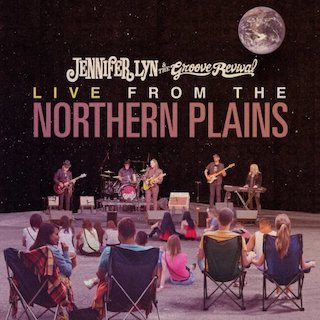 49. LIVE FROM THE NORTHERN PLAINS, Jennifer Lynn & The Groove Revival (J&R Collective)– Let’s all concede the improbability of anyone topping Gregg Allman singing “Midnight Rider” and “Whipping Post.” At the same time, be open enough to hear muscular-voiced blues singer Jennifer Lynn throw her full soul into both numbers with the powerhouse backing of the Groove Revival quartet and with the result being you hearing the tunes with new ears. Both songs are featured among the 10 tracks on the superb Live From the Northern Plains. A no-nonsense and unflagglingly vulnerable vocalist, Lynn’s every note comes from an honest place, free from even a scintilla of Gregg affect, to the point where it simply soars into its own stratosphere on both numbers. The impact of her performance is further deepened by the rhythm section’s indefatigable drive as guitarist Richard Torrance divests himself of two searing, merciless lead guitar sorties enhancing the dramatic narrative of “Midnight Rider” and the ferocity of desperation and despair articulated in “Whipping Post.” While we’re handing out plaudits, let’s tip our hats to Barb Jiskra for her robust, humming keyboard underpinning the vocals and solos. Follow this link to the full review, “In Heavy Rotation: LIVEr Than Ever,” in Deep Roots.
49. LIVE FROM THE NORTHERN PLAINS, Jennifer Lynn & The Groove Revival (J&R Collective)– Let’s all concede the improbability of anyone topping Gregg Allman singing “Midnight Rider” and “Whipping Post.” At the same time, be open enough to hear muscular-voiced blues singer Jennifer Lynn throw her full soul into both numbers with the powerhouse backing of the Groove Revival quartet and with the result being you hearing the tunes with new ears. Both songs are featured among the 10 tracks on the superb Live From the Northern Plains. A no-nonsense and unflagglingly vulnerable vocalist, Lynn’s every note comes from an honest place, free from even a scintilla of Gregg affect, to the point where it simply soars into its own stratosphere on both numbers. The impact of her performance is further deepened by the rhythm section’s indefatigable drive as guitarist Richard Torrance divests himself of two searing, merciless lead guitar sorties enhancing the dramatic narrative of “Midnight Rider” and the ferocity of desperation and despair articulated in “Whipping Post.” While we’re handing out plaudits, let’s tip our hats to Barb Jiskra for her robust, humming keyboard underpinning the vocals and solos. Follow this link to the full review, “In Heavy Rotation: LIVEr Than Ever,” in Deep Roots.

‘Whipping Post,’ Jennifer Lynn and the Groove Revival, from Live From the Northern Plains
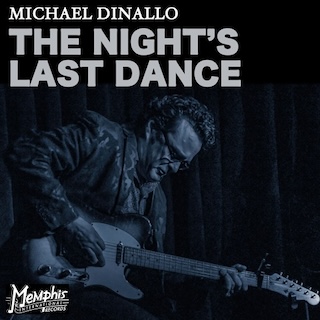 50. THE NIGHT’S LAST DANCE, Michael Dinalo (Memphis International Records)-– However he has chosen to express himself over the years, Michael Dinalo makes it memorable. In late 2024 he returned with an all-instrumental album notable for sounding better every time it’s cued up. Co-produced by the artist in tandem with Tim Carter and recorded at studios in Nashville and Ridgetop, Tennessee, and in Shrewsbury, Massachusetts, Dinalo’s original songs reflect his musical roots as well as his love of nature, hence the spiritual grace in his reflective soloing and in the space he gives his collaborators (co-producer Carter on mandolin and banjo; Ken Field on harmonica; John Josefson, vindeharp) to answer and complement his viewpoint, if you will.
50. THE NIGHT’S LAST DANCE, Michael Dinalo (Memphis International Records)-– However he has chosen to express himself over the years, Michael Dinalo makes it memorable. In late 2024 he returned with an all-instrumental album notable for sounding better every time it’s cued up. Co-produced by the artist in tandem with Tim Carter and recorded at studios in Nashville and Ridgetop, Tennessee, and in Shrewsbury, Massachusetts, Dinalo’s original songs reflect his musical roots as well as his love of nature, hence the spiritual grace in his reflective soloing and in the space he gives his collaborators (co-producer Carter on mandolin and banjo; Ken Field on harmonica; John Josefson, vindeharp) to answer and complement his viewpoint, if you will.

‘Spring and Summer Suite,’ Michael Dinalo, with Tim Carter on banjo, from The Night’s Last Dance
That The Night’s Last Dance has its heart in the natural world is emphasized in the album’s striking centerpiece, a near-five-minute, four-part, all-acoustic “Spring and Summer Suite,” in which the aforementioned collaborators play a major role. So do the soothing sounds of a babbling brook and crickets chirping softly that separate each of the suite’s mellow but lively movements (“Eggemoggin Brook,” “New River Seranade,” “Macomber Rill” and “New River Breakdown”), all with wonderful byplay between Dinalo’s guitar and Carter’s mandolin in jaunty moments, and affecting touches from Carter’s banjo in more sedate passages—all in all, close your eyes and you might think you’re hearing the earthy sounds of Norman Blake’s beloved Rising Fawn String Ensemble, which speaks volumes about the skill and expressive artistry at hand here. Follow this link to the full review, “All the Beauty Within,” in Deep Roots.
Follow this link to the Albums of the Year reviews.



